#which might? affect my scholarship
Explore tagged Tumblr posts
Text
trying to get shit sorted out for fall semester but no one is back in office until it starts is. not ideal
#quil's unholy underworld#noticed something funky. probably because of all my transfer credits and doing multiple degree paths#which might? affect my scholarship#and i'm just like hey. how do I get this sorted out#but all the people I need to talk to and the people I need to fill out forms for me. are not in office#so I'm waiting to hear about this one class. and i'm scheduled with two other people for after the semester starts#and just sitting here like. sure hope there's no urgent deadlines for this#because like. i am an EXCELLENT student#i'm not gonna tone that one down I am. hands down. an exemplary student on all levels#if something in the system is weird it's because it doesn't understand what i'm doing#because I admittedly am doing things atypically. due to my major headstart and multiple disciplines#so the normal measures of progress and such. simply don't apply to what I'm doing#so I'd hate for it to get fucked up over that#it says I'm failing to make progress. and I'm like. i CAME here with 112 credits. i am doing 2.5 degree paths possibly 3#i have over a 4.0#whatever is causing that is. i am fully confident. wrong#but if I ignore it it could cause major headaches and problems#so I wanna fix it. but I CAN'T right now because the people I need aren't back yet!#so I just gotta sit with it! and I hate that!#i wanna get it fixed eorigjaeoirgaoewrng#i think there's two potential ways to fix it but either one i have to wait </3
9 notes
·
View notes
Text
PODCAST RECS - Debunking and Fact-Checking for Witches & Witchcraft Spaces
A collection of podcast episodes fact-checking, debunking, or just providing some clarity on modern myths, misinformation, and conspiracy theories that are frequent flyers in witchcraft and pagan spaces, both theories mistakenly touted by community members and some of the utter drivel spouted by non-witches that still affects us today. Check out these shows on your favorite podcast app!
(Updates to be made whenever I find new content. There will be some crossover with my Witches In History Podcast Recs post and some of the content will be heavy. Blanket trigger warning for violence, abuse, bigotry, sexism, antisemitism, and mistreatment of women, queer people, and children.)
[Last Updated: October 17, 2024]
This post is broken into three basic sections:
Historical Misinformation
Modern Myths and the People Who Create Them
Conspiracy Theories and Moral Panics
List of Cited Podcasts, in alphabetical order
American Hysteria
BS-Free Witchcraft
Dig: A History Podcast
Hex Positive
Historical Blindness
History Uncovered
Morbid
Occultae Veritatis
Our Curious Past
Our Fake History
Ridiculous History
Stuff You Missed In History Class
The History of Witchcraft
Unobscured
You’re Wrong About…
Historical Misinformation
General History of Witchcraft
Historical Blindness - A Rediscovery of Witches, Pt 1 & 2 Oct 13, 2020 & Oct. 27, 2020 A discussion of the early modern witch craze and the myths, misconceptions, and theories about witches spread by academics. Topics of discussion include the works of Margaret Murray and Charles Leland, the founding of Wicca, the emergence of the midwife-witch myth, and folk healers as targets of witchcraft accusations. Sarah Handley-Cousins of “Dig: A History Podcast” supplies guest material for both episodes.
Hex Positive, Ep. 36 - Margaret Effing Murray with Trae Dorn July 1, 2023 Margaret Murray was a celebrated author, historian, folklorist, Egyptologist, archaeologist, anthropologist, first-wave feminist, and the first woman to be appointed to the position of lecturer in archaeology in the UK. So why so we get so annoyed whenever her name is mentioned in conversations about witchcraft? Well, it all has to do with a book Margaret wrote back in 1921...which just so happened to go on to have a profound influence on the roots of the modern witchcraft movement.
Nerd & Tie senpai and host of BS-Free Witchcraft Trae Dorn joins Bree NicGarran in the virtual studio to discuss the thoroughly-discredited witch-cult hypothesis, Murray's various writings and accomplishments, and why modern paganism might not have caught on so strongly without her.
BS-Free Witchcraft, Ep 03: The History of Wicca October 06, 2018 On this episode, Trae digs deep into the history of Wicca, and tries to give the most accurate history of the religion as they can. I mean, yeah, we know this is a general Witchcraft podcast, but Wicca is the most widely practiced form of Witchcraft in the US, UK, Canada and Australia… so how it got started is kind of important for the modern Witchcraft movement. (And trust me, there aren’t any pulled punches here.)
BS-Free Witchcraft, Ep. 28: The Burning Times May 30, 2020 On this installment of the podcast, we tackle probably one of the more controversial topics in the modern witchcraft movement: The Burning Times. What were the actual “Burning Times,” where do we get that phrase from, and what really happened? Also, how has this phrase been used in modern witchcraft? It’s a heavy one, folks.
Dig: A History Podcast - Both Man and Witch: Uncovering the Invisible History of Male Witches Sept 13, 2020 Since at least the 1970s, academic histories of witches and witchcraft have enjoyed a rare level of visibility in popular culture. Feminist, literary, and historical scholarship about witches has shaped popular culture to such a degree that the discipline has become more about unlearning everything we thought we knew about witches. Though historians have continued to investigate and re-interpret witch history, the general public remains fixated on the compelling, feminist narrative of the vulnerable women hanged and burned at the stake for upsetting the patriarchy. While this part of the story can be true, especially in certain contexts, it’s only part of the story, and frankly, not even the most interesting part. Today, we tackle male witches in early modern Eurasia and North America!
Dig: A History Podcast - Doctor, Healer, Midwife, Witch: How the the Women’s Health Movement Created the Myth of the Midwife-Witch Sept 6, 2020 In 1973, two professors active in the women’s health movement wrote a pamphlet for women to read in the consciousness-raising reading groups. The pamphlet, inspired by Our Bodies, Ourselves, looked to history to explain how women had been marginalized in their own healthcare. Women used to be an important part of the medical profession as midwives, they argued — but the midwives were forced out of practice because they were so often considered witches and persecuted by the patriarchy in the form of the Catholic Church. The idea that midwives were regularly accused of witchcraft seemed so obvious that it quickly became taken as fact. There was only one problem: it wasn’t true. In this episode, we follow the convoluted origin story of the myth of the midwife-witch.
Dig: A History Podcast - Cheesecloth, Spiritualism, and State Secrets: Helen Duncan’s Famous Witchcraft Trial July 3, 2022 Helen Duncan was charged under the 1735 Witchcraft Act, but her case was no eighteenth-century sensation: she was arrested, charged, and ultimately imprisoned in 1944. Of course, in 1944, Britain was at war, fighting fascism by day on the continent and hiding in air raid shelters by night at home. The spectacle of a Spiritualist medium on trial for witchcraft seemed out of place. What possessed the Home Secretary to allow this trial to make headlines all across the UK in 1944? That’s what we’re here to find out.
The Conspirators, Ep. 63 - The Last Witch Trial Nov. 26, 2017 England’s official laws regarding the prosecution of witches dates back to the 1600s. Those very same laws would also remain on the books until well into the 20th century. In 1944, a psychic medium named Helen Duncan would gain notoriety by becoming the last woman to be tried under England’s witchcraft laws.
The History of Witchcraft Podcast, hosted by Samuel Hume Witches didn’t exist, and yet thousands of people were executed for the crime of witchcraft. Why? The belief in magic and witchcraft has existed in every recorded human culture; this podcast looks at how people explained the inexplicable, turned random acts of nature into conscious acts of mortal or supernatural beings, and how desperate communities took revenge against the suspected perpetrators.
Unobscured, Season One - The Salem Witch Trials Welcome to Salem, Massachusetts. It’s 1692. And all hell is about to break loose.
Unobscured is a deep-dive history podcast from the labs of How Stuff Works, featuring the writing and narrative talents of Aaron Mahnke, horror novelist and the mind behind Lore and Cabinet of Curiosities.
As with his other series, Mahnke approaches the events in Salem armed with a mountain of research. Interviews with prominent historians add depth and documentation to each episode. And it’s not just the trials you’ll learn about; it’s the stories of the people, places, attitudes, and conflicts that led to the deaths of more than twenty innocent people.
Each week, a new aspect of the story is explored, gradually weaving events and personalities together in chronological order to create a perspective of the trials that is both expansive and intimate. From Bridget Bishop to Cotton Mather, from Andover to Salem Town, Mahkne digs deep to uncover the truth behind the most notorious witch trials in American history.
Think you know the story of Salem? Think again.
Witchcraft and Other Magical Practices
BS-Free Witchcraft, Ep. 43 - “Lilith” Jan. 29, 2022 Host Trae Dorn discusses the ongoing debate over whether or not it’s okay for non-Jewish witches to incorporate Lilith into their practices. Is Lilith closed? Is it cultural appropriation? There’s so much misinformation in New Age and poorly written witchcraft books on Lilith, it’s hard for some witches to get a clear picture. It’s common to run into folks on social media talking about Lilith as a “Goddess,” which she very much isn’t. Let’s dive into the origins of the folklore surrounding this figure, and we’ll let you decide whether or not it’s okay to work with Lilith. But, uh, spoiler – we don’t think you should.
Historical Blindness, Ep. 106 - Lilith, the Phantom Maiden November 22, 2022 Host Nathaniel Lloyd explores the evolution of the figure of Lilith, from Mesopotamian demon, to the first woman created by God, and back to a succubus mother of demons. It’s a tale of syncretism, superstition, forgery, and a dubious interpretation of scriptures.
BS-Free Witchcraft, Ep. 55 - Lucky Girl Syndrome and the Law of Attraction January 28, 2023 Trae takes a look at one of New Age spirituality’s most toxic philosophies - The Law of Attraction. The history of the idea is discussed, where it came from, and how this dangerous combination of prosperity gospel, purity culture, and victim-blaming has come back in a major way to a whole new generation as “Lucky Girl Syndrome.”
Hex Positive, Ep. 19 - The Trouble with Tarot August 1, 2021 Tarot and tarot-reading have been a part of the modern witchcraft movement since the 1960s. But where did these cards and their meanings come from? Are they secretly Ancient Egyptian mystical texts? Do they have their origins among the Romani people? Are they a sacred closed practice that should not be used by outsiders? Nope, nope, and nope.
This month, we delve into the actual history of tarot cards, discover their origins on the gaming tables of Italy and France, meet the people who developed their imagery and symbolism into the deck we know today, and debunk some of the nonsense that’s been going around lately concerning their use. The Witchstorian is putting on her research specs for this one!
Stuff You Missed in History Class - A Brief History of Tarot Cards Oct. 26, 2020 How did a card game gain a reputation for being connected to mysticism? Tarot’s history takes a significant turn in the 18th century, but much of that shift in perception is based on one author’s suppositions and theories.
Hex Positive, Ep. 23 - The Name of the Game November 1, 2021 Bree delves into the history, myths, and urban legends surrounding Ouija boards. Along the way, we’ll uncover their origins in the spiritualist movement, discover the pop culture phenomenon that labeled them portals to hell, and try to separate fact from internet fiction with regard to what these talking boards can actually do.
Our Curious Past, Ep. 20 - The Curious History of the Ouija Board August 18, 2023 Host Peter Laws explores the history of the “talking board,” which was wildly popular in the early 1900s, until something happened that would tarnish its’ reputation for good.
Ridiculous History - Brooms and Witchcraft, Pt. 1 & 2 Oct. 13-15, 2020 Most people are familiar with the stereotypical image of a witch: a haggard, often older individual with a peaked hat, black robes, a demonic familiar and, oddly enough, a penchant for cruising around on broomsticks. But where did that last weirdly specific trop of flying on a broomstick actually come from? Could the stereotype of witches on broomsticks actually be a drug reference? Join Ben, Noel, and Casey as they continue digging through the history and folklore of witchcraft - and how it affected pop culture in the modern day.
Historical Blindness, Ep. 116 - The Key to the Secrets of King Solomon May 02, 2023 Host Nathaniel Lloyd continues his occasional series on the history and mythology of magic. In this installment, he looks at the development of the story that the biblical King Solomon was actually a flying-carpet-riding, magic-ring-wielding wizard and alchemist who bound demons to do his will. The origins and content of the legendary Key of Solomon are also discussed.
Dig: A History Podcast - Plastic Shamans and Spiritual Hucksters: A History of Peddling and Protecting Native American Spirituality July 24, 2022 In the late 20th century, white Americans flocked to New Age spirituality, collecting crystals, hugging trees, and finding their places in the great Medicine Wheel. Many didn’t realize - or didn’t care - that much of this spirituality was based on the spiritual faiths and practices of Native American tribes. Frustrated with what they called “spiritual hucksterism,” members of the American Indian Movement (AIM) began protesting - and have never stopped. Who were these “plastic shamans,” and how did the spiritual services they sold become so popular?
Historical Blindness, Ep. 145 - All Is Number: Pythagoras and Numerology May 28, 2024 In this installment of the ongoing Encyclopedia Grimoria series, host Nathaniel Lloyd talks about a cult leader who is remembered as a great mathematician, whose real lasting contribution to the world is the nonsensical divination "magic" known as numerology.
Holidays
Hex Positive, Ep. 28 - The Easter-Ostara Debacle April 1, 2022 Host Bree NicGarran puts on her Witchstorian hat once more to delve into the origins of both Easter and Ostara and to finally answer the age-old question: which came first – the bunny or the egg?
Historical Blindness, Ep. 28 - A Very Historically Blind Christmas Dec. 18, 2018 An exploration of the origins of Christmas traditions, with special guest Brian Earl of the Christmas Past podcast. (There is also some mention of Christmas witches!) Further installments of this series explore additional Christmas traditions and iconography which have been falsely claimed to have pagan origins as well as the myths surrounding the history of Christmas itself. (Eps. 47, 63, 84, & 132 in December of subsequent years)
Modern Myths and the People Who Create Them
Ed and Lorraine Warren
You’re Wrong About…Ed and Lorraine Warren w. Jamie Loftus Nov 8 2021 Special Guest Jamie Loftus tells Sarah about Ed and Lorraine Warren (of The Conjuring and Annabelle fame). Topics of interest include Connecticut as a locus of scary happenings, New England uncles, and psychic communication with a tearstained Bigfoot.
Dig: A History Podcast - The Demonologist and the Clairvoyant: Ed and Lorraine Warren, Paranormal Investigation, and Exorcism in the Modern World Oct 3 2021 In the 1970s, Lorraine and Ed Warren had a spotlight of paranormal obsession shining on them. In the last decade, their work as paranormal investigators–ghost hunters–has been the premise for a blockbuster horror franchise totaling at least seven films so far, and more planned in the near future. So… what the heck? Is this for real? Yes, friends, today we’re talking about demonology, psychic connections to the dead, and the patriarchy. Just a typical day with your historians at Dig.
History Uncovered, Ep. 92 - The Enfield Haunting That Inspired "The Conjuring 2" Oct 25 2023 The Enfield Haunting began with a bang. Literally. From 1977 to 1979, an unassuming North London home was the site of near-constant paranormal activity, from knocking sounds and moving objects to disembodied voices and the terrifying alleged possession of one young daughter of the Hodgson family. But how much truth was there to these happenings? And since the Warrens got involved briefly and subsequently touted themselves as experts on the case (and made money from talking about it), how much of what we think we know reflects the actual events?
Hex Positive, Ep. 042 - Extended Warren Tea with Jenn the Ouija Girl and Lorelei Rivers Jan 01 2024 Discussions about the careers and rhetoric of the Warrens make the rounds regularly in conversations about the paranormal among members of the witchcraft community. But who were the Warrens? Why do they inspire such ire even as the Conjuring franchise gains steam? How much of what we think we know about the supernatural comes from them? And why is it important to recognize - and refute - their rhetoric when we encounter it? Bree NicGarran sits down with Jenn the Ouija Girl and Lorelei Rivers to spill ALL the tea.
"Paranormal" Literature & Media
You’re Wrong About…Winter Book Club - The Amityville Horror, Pts. 1-3 Dec 20 2021 - Feb 6 2022 Sarah tells guest host Jamie Loftus about the Amityville Horror, how it’s a Christmas story, and buying murder furniture might not be such a great idea. Further highlights include Jodie the Demon Pig, poor insulation and terrible parenting as evidence of a haunting, lots and lots of sunk cost fallacy, and how the book kind of debunks itself.
MORBID, Ep. 610 - The Amityville Horror Conspiracy October 17 2024 The supposed experience of the Lutz family at 112 Ocean Avenue served as the basis for the iconic haunted house story, “The Amityville Horror,” and the countless films adapted from or inspired by the original novel. However, unlike most other stories of paranormal experiences, “The Amityville Horror” became a phenomenon that influenced everything from Ronald DeFeo’s criminal defense during his murder trial to the American public’s belief in the supernatural. Yet for all their talk of it being a genuine story of demonic activity, in the years since the publication of the popular novel, a large body of evidence from skeptical evaluations to court records and interview transcripts suggest that America’s most notorious haunted house might not have been quite so haunted after all.
American Hysteria, Ep. 125 - I Was A Teenage Poltergeist October 14 2024 Sarah Marshall, host of “You’re Wrong About…,” transports us to the old world of British Hysteria to reveal the mysterious story of the Enfield Poltergeist and joins host Chelsea Weber Smith at the seance table to discuss the great unknown and the ghosts they know.
You’re Wrong About… - Michelle Remembers, Pt. 1-5 March 26, 2020 - April 30, 2020 Intrepid hosts Sarah and Mike delve into one of the foundational texts of the Satanic Panic - “Michelle Remembers.” A young woman spends a year undergoing hypnosis therapy, which uncovers repressed memories of shocking and horrifying abuse at the hands of a Satanic cult. The book became a foundational text for both mental health professionals and law enforcement attempting to grapple with an alleged nationwide network of insidiously invisible child-abducting cults. The only problem is…none of what Michelle remembered ever actually happened.
You’re Wrong About…. - The Satan Seller, Pt. 1-5 June 28, 2021 - August 9, 2021 Sarah and Mike return to Camp You’re Wrong About for another Satanic Panic story hour. This time, the summer book club explores Mike Warnke’s 1972 “memoir” about joining a demonic cult, rising through the ranks of Satan’s favorite lackeys, his sudden downfall and redemption, and the California hedonism that made him do it. This is followed by a discussion of the Cornerstone Magazine exposé that brought the facts to light and thoroughly discredited Warnke’s story.
American Hysteria, Eps. 64-66 - Chick Tracts, Pts. 1-3 March 20 - April 03, 2023 In his own lifetime, Jack Chick was one of most prolific and widely-read comic artists in history. His company, Chick Tracts, published hundreds of millions of copies of pocket-sized bible comics, filled with lurid illustrations of cackling demons, wicked witches, and sinister cults, all hell-bent on corrupting any hapless mortal they could get their hands on. These tracts were meant to be left where they might be found by a sinner in need of salvation, with a scared-straight morality-play approach to Christianity that contributed in no small part to the period in the late 20th century we now call the Satanic Panic. (There’s also a follow-up two-part episode about one of Chick’s “occult experts,” who claimed to be, among other things, a real-life vampire.)
History Uncovered, Ep. 95 - Roland Doe, The Boy Who Inspired "The Exorcist" November 15, 2023 In 1949, priests performed an exorcism on a boy referred to as "Roland Doe," aka Ronald Hunkeler, in a chilling ordeal that became the real-life inspiration for William Peter Blatty's 1971 book, "The Exorcist," and the movie adaptation released in 1973. But what really happened during this alleged exorcism and was there any proof of the claims of alleged demonic paranormal activity surrounding the events?
You're Wrong About... - The Exorcist (with Marlena Williams) December 27, 2023 Marlena Williams, author of "Night Mother: A Personal and Cultural History of the Exorcist," joins host Sarah Marshall to discuss the little possession movie that changed America forever. Was the set cursed by Satan himself, or plain old 70s misogyny? What makes a country going through a cultural upheaval embrace stories about the Devil? And - the most critical question of all - do Ouija boards really cause possession?
Frightful, Bonus Episode - Is the Paranormal Like A New Religion? June 25 2024 Since the early 2000s, paranormal content has exploded in popular culture. It seems we can't get enough of ghosts (and hunting for them). What could be behind this enthusiasm for spooky things? Host Peter Laws shares a theory - that the paranormal is a clever way for us to be religious...without being religious. (This is less a debunking than a discussion of a personal hypothesis, but it deals with the pervasiveness of cultural religious themes, the influence of social media on modern mythmaking, and the sense of community surrounding paranormal belief.)
Conspiracy Theories and Moral Panics
Ancient "Mysteries"
Historical Blindness, Pyramidiocy, Eps. 146-151 June-July 2024 Host Nathaniel Lloyd delves into the great pyramids and the various myths and misconceptions surrounding them, some of which, despite vast amounts of historical evidence to the contrary, endure to this very day. Further related segments on this topic may be found on the show's Patreon, including a highly interesting July 2024 minisode regarding "Books of the Dead," which examines claims about H.P. Lovecraft's "Necronomicon" and its' supposed relation to the Egyptian Book of the Dead and the Emerald Tablet of Hermes Trismegistus.
History Uncovered, Ep. 117 - The Real History Behind the Mythic City of Atlantis June 12, 2024 First mentioned by Plato in Timaeus and Critias, the lost city of Atlantis later became a widely debated topic among historians. But is Atlantis real? (Spoiler: No. No it is not.)
Hucksters, Secret Societies, and Antisemitism
Historical Blindness, Ep. 14 - Bloody Libel December 12, 2017 An exploration of one of the most destructive myths in history - the blood libel, or the false accusation that Jews of the Middle Ages and beyond ritually murdered Christian children, a lie that host Nathaniel Lloyd traces back to its’ roots in medieval England and the murder of one Young William of Norwich.
Historical Blindness, Eps. 56-57 - The Illuminati Illuminated September 15-29, 2020 A contemplation of the modern conservative conspiracy theory of a “deep state” leads host Nathaniel Lloyd back to the dawn of the modern conspiracy theory, the Enlightenment, when the ultimate conservative conspiracy theory was born as an explanation for the French Revolution: The Illuminati!
Historical Blindness, Eps. 38-40 - Nazi Occultism, Parts 1-3 July 2-30, 2019 An exploration of the dark roots of Nazi occult philosophies, from a neo-paganism preoccupied with the Nordic Pantheon, to a folksy back-to-the-land movement that evolved into a nationalist sentiment, to an ideology of racial supremacy all tied up with contemporary myths and pseudoscience. (The host is careful to note with clarity and vehemence at the start of each episode that this series IN NO WAY approves of, promotes, or supports this ideology and Nazism is roundly condemned at every turn. It’s not an easy listen, but understanding how and why this bigotry continues to be a problem in pagan spaces and how to recognize it is very important.) TL;DR - Fuck Nazis. No tolerance for genocidal fuckwads.
DIG: A History Podcast - Werewolves, Vampires, and the Aryans of Ancient Atlantis: The Occultic Roots of the Nazi Party Oct 17, 2021 Modern movie plotlines which portray Nazi obsessions with occultism might be exaggerated for dramatic effect, but they aren't made up out of wholecloth. The NSDAP, or the National Socialist Worker's Party, was a party ideologically enabled by occultist theories about the Aryan race and vampiric Jews, on old folk tales about secret vigilante courts and nationalist werewolves, and on pseudoscientific ideas about ice moons. In this episode, the hosts explore the occult ideas, racial mythology, and 'supernatural imaginary' that helped to create the Nazi Party.
Our Fake History, Eps. 66-68: Who Was the Mother of the Occult? May-June 2018 An exploration of the life and works of Helena Petrovna Blavatsky, self-described sage, medium, guru, author, and one of the founders of Theosophy.
The Satanic Panic
American Hysteria - Satanic Panic, pt 1 & 2 Dec. 10 2018 - Jan. 07, 2019 This two-part episode covers perhaps the most mystifying moral panic in US history, the 1980s and early 90s ‘Satanic Panic.’ For this episode, Chelsey covers the rise of organized Satanism beginning in the late 60s, as well as the adversarial countercultures of the hippies and the metalheads, and their apparent Satanic crimes that would be hailed as proof of their evil, as well as proof that teens, as well as children, were in serious moral peril. Satan was allegedly hypnotizing the youth with secret messages in backwards rock songs, teaching them occult magic in Saturday morning cartoons, and causing suicides through a popular role-playing games, all while helping religion blur into politics for good.
For part two, Chelsey will cover what came next, a serious investigation into an imagined network of Satanic cults ritually abusing children in daycare centers all over the country. Chelsey will try to understand this shocking decade in history, why it really happened, and the cultural issues it was really about.
BS-Free Witchcraft, Ep 10 - The Satanic Panic April 27, 2019 The Satanic Panic of the 70s, 80s, and 90s shaped the Modern Witchcraft Movement in a lot of unexpected ways. Its effects still ripple through a lot of our sources, so in this installment of the podcast we’re digging into this extremely weird part of American history. It’s a bit of a doozy, after all.
BS-Free Witchcraft - Ep. 32: A New Satanic Panic? February 27, 2021 A couple of years ago, we did an episode on the history of the Satanic Panic of the latter half of the twentieth century, but recent events have led us to ask - could it be happening again? It’s very possible that we are at the start of a new wave of satanic panic, and QAnon is just the latest symptom of a larger problem.
Occultae Veritatis, Case #014: Satanic Panic of Martensville Jan. 28, 2018 Today the hosts cover one of the various Satanic ritual abuse scandals that happened close to them. Is it full of hot air and false allegations? Yes. Yes it is.
Occultae Veritatis, Case #097A & B: Dungeons, Dragons, and the Satanic Panic Dec. 07, 2019 - Dec. 15, 2019 Dungeons & Dragons, introduced in 1974, attracted millions of players, along with accusations by some religious figures that the game fostered demon worship and a belief in witchcraft and magic.
[Last Updated: October 17 2024]
1K notes
·
View notes
Text
Judaism, Angels, and Monstrosity
@neapolitangirl asked:
I'm writing a story about the angel Muriel traveling through a world inspired by American folklore (Ex. The Bell Witch, Fearsome Critters, etc) while hunting demons. I wanted to draw inspiration from the legend that says Muriel and Abaddon are one and the same because I thought it was interesting. However, I also know that Abaddon is important to Jewish cosmology and wanted to avoid any unfortunate implications. Muriel is very skittish and kind of a coward, but turns into the more violent and vengeful Abaddon in the presence of demons. Appearance-wise both Muriel and Abaddon are tall and skinny, but Muriel is more like an owly-human while Abaddon is a spiky skeletal being. Would this be connecting Judaism to monstrosity? Also, is there anything else I should try to avoid?
So…angelology, the whole idea of angels with names and personalities and individual jobs, is just…not something the average Jewish person thinks or cares about, even the ones who know a little about it. Not that it’s bad, it’s just not something that is prominent enough that it would have tropes attached that we might be able to warn you against.
That said, we’re posting on the Niche Scholarship and Special Interest website, so if there’s a reader who happens to have a lot of knowledge and feelings about Jewish angelology we would welcome the contribution and specialized expertise.
As it stands, my instinct is to give these more general considerations:
Balancing Jewish and Christian Elements
To what degree are you trying to tell a Jewish story, a Christian story that does not harm Jewish readers, or a story strongly influenced by Christian ideas about the heavens in a way that does not harm Jewish readers? How does deciding where you fall among those distinctions affect how you construct your story, and how you portray your angels?
Jewish Concept of God and Angelic Appearances
To Jews, God Godself does not have a physical body or visible appearance. If you’re describing the appearance of God as you’re navigating your angel-centering narrative, you’re squarely outside the territory of inclusivity toward Jewish readers. That’s okay, if you’re clear with readers that you’re not telling a Jewish story. It’s not okay if you’re trying to conflate Jewish and Christian ideas into a single narrative when they are often incompatible.
Angelic Appearances and Jewish Scripture
Angels might have appearances, and some descriptions of some types of angels in some Jewish scriptures have body parts of various animals. I haven’t the foggiest clue if it matters to anyone what appearances belong to which angels, so if it matters to someone reading this I hope they will speak up.
Are angels Jewish? This is a subject that could make for a fun discussion among Jewish people as a way of exploring the nature of Jewishness, but in your narrative you will have to think this through in your own way. If your angels engage in Jewish practices, then what does that look like and why, and if they don’t, why don’t they? The answer to that may of course be “Because I’m not actually telling a Jewish story.”
Christian Themes and Sensitivity to Jewish Culture
It’s okay to not be telling a Jewish story. But in that case keep in mind what demonstrations of Jewishness you include in a Christian story.
Especially, if you’re depicting a divine Jesus, or a Jesus character with any type of more-than-human powers or ancestry, or you are including any reference to the idea that Christianity might be in any way objectively correct, then you must tread EXTREMELY CAREFULLY with including any depiction of Jewish practice in your work, as the line where depiction turns to appropriation is in that case extremely near.
In all things, try and avoid depicting Jewish humans and any character who might be Jewish or be seen as Jewish in ways that are otherwise harmful: we’ve often talked about tropes around greed, sneakiness, power-grabbing, gender and sexual dynamics, and other tropes that apply to portrayals of Jewish characters. If your angels are Jewish, or Jew-ish in flavor, that goes for them as well.
Again, I know absolutely zero about Muriel and Abbadon and am not very interested in learning more as their lore has zero bearing on my Jewish practice in any way, and that’s a somewhat important point to me to be making because…2J3O. Two Jews, three opinions. So again, if a reader does in fact have knowledge and opinions about the specific angels themselves, please speak up.
–Meir
569 notes
·
View notes
Note
hello! im just finishing up my read of structures of scientific revolutions, which has genuinely been very useful and shifted my understanding of science in a way being around people doing scientific research all day really didn't! i don't have a liberal arts education so i would love to get a sense of (a) what else of the philosophy / history of science canon is worth reading in the original (b) standard review papers or introductory textbooks and (c) critiques of the canon. i understand this is a big ask ofc, so feel free to point me to good depts / syllabi from good courses. thanks :)
yessss such a fun question >:) so, the thing that was so great about 'the structure of scientific revolutions', which i'm sure you've picked up on, is that kuhn pushed historians and philosophers of science to challenge the positivist model of science as a linearly progressive search to 'accumulate knowledge'. the idea of a 'paradigm shift' was itself a paradigm shift at the time; it was an early example of a language for talking about radical change in science without giving into the assumption that change necessarily = 'progress' (defined by national interests, mathematisation, and so forth). this is still an approach that's foundational to history and philosophy of science; it's now taken as so axiomatic that few academics even bother to gloss or defend it in monographs (which raises its own issue with public communication, lol).
where kuhn falls apart more (and this was typical for a philosopher of his era, training, and academic milieu) is in the fact that he never developed any kind of rigorous sociological analysis of science (despite alluding to such a thing being necessary) and you probably also noticed that he makes a few major leaps that indicate he's not fully committed to thinking through the relationship between science and politics. so for example, we might ask, can a paradigm shift ever occur for a reason other than a discovered 'anomaly' that the previous paradigm can't account for? for instance, how do political investments in science and scientific theories affect what's accepted as 'normal science' in a kuhnian sense? are there historical or present cases where a paradigm didn't change even though it persistently failed to explain certain empirical observations or data? what about the opposite, where a paradigm did change, but it wasn't necessarily or exclusively because the new paradigm was a 'better' explanation scientifically? how do we determine what makes an explanation 'better', anyway, especially given that kuhn himself was very much invested in moving beyond the naïve realist position? and on the more sociological side, we can raise issues like: say you're a scientist and you legitimately have discovered an 'anomaly'. how do you communicate that to other scientists? what mechanisms of knowledge production and publication enable you to circulate that information and to be taken seriously? what modes of communication must you use and what credentials or interpersonal connections must you have? what factors cause theories and discoveries to be taken more or less seriously, or adopted more or less quickly, besides just their 'scientific utility' (again, assuming we can even define such a thing)?
again, this is not to shit on kuhn, but to point out that both history and philosophy of science have had a lot of avenues to explore since his work. note that there are a few major disciplinary distinctions here, each with many sub-schools of thought. a 'science and technology studies' or STS program tends to be a mix of sociological and philosophical analysis of science, often with an emphasis on 'technoscience' and much less on historical analysis. a philosophy of science department will be anchored more firmly in the philosophical approach, so you'll find a lot of methodological critique, and a lot of scholarship that seeks to tackle current aporias in science using various philosophical frameworks. a history of science program is fundamentally just a sub-discipline of history, and scholarship in this area asks about the development of science over time, how various forms of thinking came into and out of favour, and so forth. often a department will do both history and philosophy of science (HPS). historians of medicine, technology, and mathematics will sometimes (for arcane scholastic reasons varying by field, training, and country) be anchored in departments of medicine / technology / mathematics, rather than with other faculty of histsci / HPS. but, increasingly in the anglosphere you'll see departments that cover history of science, technology, and mathematics (HSTM) together. obviously, all of these distinctions say more about professional qualifications and university bureaucracy than they do about the actual subject matter; in actuality, a good history of science should virtually always include attention to some philosophical and sociological dimensions, and vice versa.
anyway—reading recs:
there are two general reference texts i would recommend here if you just want to get some compilations of major / 'canonical' works in this field. both are edited volumes, so you can skip around in them as much as you want. both are also very limited in focus to, again, a very particular 'western canon' defined largely by trends in anglo academia over the past half-century or so.
philosophy of science: the central issues (1998 [2013], ed. martin curd & j. a. cover). this is an anthology of older readings in philsci. it's a good introduction to many of the methodological questions and problems that the field has grown around; most of these readings have little to no historical grounding and aren't pretending otherwise.
the cambridge history of science (8 vols., 2008–2020, gen. eds. david c. lindberg & ron numbers). no one reads this entire set because it's long as shit. however, each volume has its own temporal / topical focus, and the essays function as a crash-course in historical methodology in addition to whatever value you derive from the case studies in their own right. i like these vols much more than the curd & cover, but if you really want to dig into the philosophical issues and not the histories, curd & cover might be more fun.
besides those, here are some readings in histsci / philsci that i'd recommend if you're interested. for consistency i ordered these by publication date, but bolded a few i would recommend as actual starting points lol. again some of these focus on specific historical cases, but are also useful imo methodologically, regardless of how much you care about the specific topic being discussed.
Robert M. Young. 1969. "Malthus and the Evolutionists: The Common Context of Biological and Social Theory." Past & Present 43: 109–145.
David Bloor. 1976 [1991]. Knowledge and Social Imagery. Chicago: University of Chicago Press (here is a really useful extract that covers the main points of this text).
Ian Hacking. 1983. Representing and Intervening: Introductory Topics in the Philosophy of Natural Science. Cambridge: Cambridge University Press.
Steven Shapin. 1988. “Understanding the Merton Thesis.” Isis 79 (4): 594–605.
Steven Shapin and Simon Schaffer. 1989. Leviathan and the Air-Pump: Hobbes, Boyle, and the Experimental Life. Princeton, NJ: Princeton University Press.
Mario Biagioli. 1993. Galileo, Courtier: The Practice of Science in the Culture of Absolutism. Chicago: University of Chicago Press.
Bruno Latour. 1993. The Pasteurization of France. Translated by Alan Sheridan and John Law. Cambridge, MA: Harvard University Press.
Margaret W. Rossiter. 1993. “The Matthew Matilda Effect in Science.” Social Studies of Science 23 (2): 325–41.
Andrew Pickering. 1995. The Mangle of Practice. Chicago: University of Chicago Press.
Porter, Theodore M. Trust in Numbers: The Pursuit of Objectivity in Science and Public Life. Princeton University Press, 1996.
Peter Galison. 1997. “Trading Zone: Coordinating Action and Belief.” In The Science Studies Reader, edited by Mario Biagioli, 137–60. New York: Routledge.
Crosbie Smith. 1998. The Science of Energy: A Cultural History of Energy Physics in Victorian Britain. Chicago: University of Chicago Press.
Chambers, David Wade, and Richard Gillespie. “Locality in the History of Science: Colonial Science, Technoscience, and Indigenous Knowledge.” Osiris 15 (2000): 221–40.
Kuriyama, Shigehisa. The Expressiveness of the Body and the Divergence of Greek and Chinese Medicine. Zone Books, 2002.
Timothy Mitchell. 2002. Rule of Experts: Egypt, Techno-Politics, Modernity. Berkeley: University of California Press.
James A. Secord. 2003. Victorian Sensation: The Extraordinary Publication, Reception, and Secret Authorship of Vestiges of the Natural History of Creation. Chicago: University Of Chicago Press.
Sheila Jasanoff. 2006. “Biotechnology and Empire: The Global Power of Seeds and Science.” Osiris 21 (1): 273–92.
Murphy, Michelle. Sick Building Syndrome and the Problem of Uncertainty: Environmental Politics, Technoscience, and Women Workers. Duke University Press, 2006.
Kapil Raj. 2007. Relocating Modern Science: Circulation and the Construction of Knowledge in South Asia and Europe, 1650–1900. New York: Palgrave Macmillan.
Schiebinger, Londa L. Plants and Empire: Colonial Bioprospecting in the Atlantic World. Harvard University Press, 2007.
Galison, Peter. “Ten Problems in History and Philosophy of Science.” Isis 99, no. 1 (2008): 111–24.
Daston, Lorraine, and Peter Galison. Objectivity. Zone Books, 2010.
Dipesh Chakrabarty. 2011. “The Muddle of Modernity.” American Historical Review 116 (3): 663–75.
Forman, Paul. “On the Historical Forms of Knowledge Production and Curation: Modernity Entailed Disciplinarity, Postmodernity Entails Antidisciplinarity.” Osiris 27, no. 1 (2012): 56–97.
Ashworth, William J. 2014. "The British Industrial Revolution and the the Ideological Revolution: Science, Neoliberalism, and History." History of Science 52 (2): 178–199.
Mavhunga, Clapperton. 2014. Transient Workspaces: Technologies of Everyday Innovation in Zimbabwe. Cambridge, MA: MIT Press.
Lynn Nyhart. 2016. “Historiography of the History of Science.” In A Companion to the History of Science, edited by Bernard Lightman, 7–22. Chichester, UK: Wiley Blackwell.
Rana Hogarth. 2017. Medicalizing Blackness: Making Racial Difference in the Atlantic World, 1780–1840. Chapel Hill: University of North Carolina Press.
Suman Seth. 2018. Difference and Disease: Medicine, Race, and the Eighteenth-Century British Empire. Cambridge, UK: Cambridge University Press.
Aro Velmet. 2020. Pasteur's Empire: Bacteriology and Politics in France, its Colonies, and the World. Oxford: Oxford University Press.
i would also say, as a general rule, these books are generally all so well-known that there are very good book reviews and review essays on them, which you can find through jstor / your library's database. these can be invaluable both because your reading list would otherwise just mushroom out forever, and because a good review can help you decide whether you even need / want to sit down with the book itself in the first place. literally zero shame in reading an academic text secondhand via reviews.
479 notes
·
View notes
Text
Little Wind
Pairing: Joel Miller x art teacher!reader
Author’s note: we are so fucking back dude
Summary: Caught out [1.6k]

“I don’t know what we need to talk about, Marnie.” You say as you walk into your apartment and throw your car keys in the dish by the door. You told her you would call her once you weren’t navigating icy roads which was partly true. You also just needed a second to prepare yourself for this conversation. “He’s a good dad. He helped out with my field trip to the McNay. I have no worries about Ellie’s safety if that’s what this is about.”
“What happened at the winter showcase?” She asks, her tone sharp. Was she there? If she was, she didn’t talk to you or make herself known. Fuck. There’s no way this can be about what you think it’s about. You’ve been careful. Going out of your way to go somewhere far away from the school and any students that might appear out of nowhere. There’ve been a few times where you’ve been a little reckless but you had it under control.
“Ellie had an anxiety attack. I sat with her and her dad in the stairwell until it passed.” You say, attempting to shrug off the cloud of worry that’s settled on your shoulders.
“And the visits to your classroom almost every week?”
“Jesus, are you spying on me?” You breathe a laugh but she doesn’t humor you. She only waits for a response. “My projector’s been broken and he’s trying to fix it for me since my work orders keep getting denied. Is there anything else I can confirm or deny for you?” You ask, glancing at your half-finished canvas as you pace. You can’t sit still. Not when she’s calling you during your break and interrogating you. She sighs and you can imagine her pinching the bridge of her nose.
“If administration finds out about this-“
“Finds out about what? My broken projector?”
“That you’re sleeping with one of your student's parents.” Your back molars buzz at her words and a wave of nausea hits you. You shake your head and take a deep breath.
“That’s not funny. You could get me fired for saying things like that.”
“Oh, c’mon, honey. This may be a big city but people talk like it’s a small town,” she says. You feel caught but you don’t want her to know that. “She’s good. She could go to State and win scholarships. But if the judges find out that you gave her any special treatment because of your relationship with her dad, not only will they fire you but you will ruin any chance she has at getting better.”
“This is ridiculous.” You say and she huffs on the other line.
“No, what’s ridiculous is the thought that you’d put your students’ well-being at risk so you can fuck around with a parent. Did you ever stop to think how Ellie might react if she finds out about this? How this might affect her?” She asks like you’re stupid. Of course, you have. It’s been the idea pressing on your brain since before the field trip.
You just never thought it’d get this far.
You think it’d break her heart if she found out. You think she’d curse and scream at you and you’d deserve it. You think she’d never want to see you again or worse, never want to make art again. The world needs Ellie’s art even if she doesn’t know it yet. And you fucked it up.
“You have until Spring Break to either break up with him or say something to Martinez.”
“Or what?”
“I will.” She says with alarming clarity.
“You know, it’s been really nice talking to you, Marnie, but I’ve gotta go do some lesson plans.” You hang up before she can respond and practically throw your phone away from you. Your head swims and you have to clutch the back of a chair to steady yourself.
What the fuck? How did she even find out? She saw you once at Whataburger months ago and now she has eyes and ears watching you? Fuck. Fuck. Fuck. Fuck. You need to tell Joel or cut contact entirely. At this point, you don’t know which is the right option. You don’t make enough money from the bar and commissions to stop teaching. You’re only on the second step of submissions for a gallery and you haven’t even finished the paintings you want to send them. And Marnie’s right, Ellie is really good. She got second place at the showcase, which didn’t surprise you, and now she has the opportunity to get her own small exhibition if she sends in her work soon.
You can’t do this. You shouldn’t have ever done this. You shouldn’t have let him into your life. You shouldn’t have put your phone number in his phone or let him sit at your bar or fucking beg him to come over like you did barely a week ago. You should’ve kept your head down and done your lesson plans and art history lessons like the good, perfect teacher you’ll never be.
You don’t know what to do with this heavy feeling in your chest, guilt and anger, and a sense of loss swirling around your ribs until you look at the lone empty canvas lying on your kitchen table. It’s the last unpainted one you have and probably the last one you’ll be able to afford for a little bit. You were saving it for something special but you can’t wait for special anymore. You have to get this out.
Without thinking, you grab the first paints your hands touch and walk out to your balcony. There’s already no way you’re getting your deposit back so you might as well make it worth it. You haphazardly put up a cloth behind the canvas before you start taking literal handfuls of paint and throwing it. Reds, purples, lumpy, half-dried-out blacks, and green splatter across the white, ruining the last bit of pure material that you had. The cold wind whips around your face and blows dust and even kicks up a few rocks that get stuck in the wet paint. Colors sprint down to kiss the pavement and leave a strange conglomeration of colors near your back door. You’re so caught up in the sloppy, angry dispersal of paint that you almost don’t realize you’re crying until a sob escapes your throat.
For the first time in a long time, you were so happy. Just deliriously, stupidly, dangerously happy. You let yourself relax and get comfortable and open up because it felt right only to be hit with the reminder that things like that aren’t reserved for you. You’ve consistently picked everyone else over yourself because that’s what teachers are supposed to do. Maybe Henry was right. Maybe you would’ve been much better suited to being the silent muse who wants for nothing. At least then you’d be able to pay your bills.
You slump onto the frigid concrete of your balcony, your paint-soaked hands shaking in front of you, and stare at the canvas. It has a weird texture from all the dirt and debris getting flown your way and the wind has made streaks in all different directions. The colors are objectively ugly together. They swirl and drip in mysterious and formless ways. It’s gritty There’s no story being told here. There’s no shape, no dimension, nothing. Your college professors would rip this to shreds if they could see it.
But the gallery might want it.
Before you can talk yourself out of it, you push yourself off the floor, scrub your freezing hands raw in the sink, wipe your tears, and send a picture of the painting to the gallery. You title the email “Something Different,” and quickly type out a message.
Hey,
Finished up some stuff today and thought you might like it. It’s something a little different. It’s called ‘Spring Break.’
You shoot out the email and turn off your phone, too anxious to watch your inbox for a response. You leave your canvas out to dry but bring in all your paint because you can’t afford to lose that much paint to the elements especially after you just finished heaping globs of it around. You don’t feel much better. You still feel the weight of Marnie’s words pressing on your lungs and the fizzing in your molars. You feel, ironically, like a girl in a painting you saw years ago.
You remember it was painted by Leighton sometime in the 1800’s. Although you can’t remember the exact historical details, you can see the painting clearly in your head. A bride and groom are stopped by a knight leaving their wedding ceremony after being showered with pink flowers. There’s a battle happening and they need the groom to join the fight. His new wife, young and dressed in white, watches the conversation and knows there’s nothing she can do. Her husband’s hand is already on his sword. He’s going to leave and die on the battlefield and she’s going to go home a widow. They’re both helpless and doomed to their obligations: him to his brothers in arms and her to her marriage.
You think you and Joel are doomed in the same way. There’s not a whole lot either of you can do to change your fate. Maybe if you had met him at a different time— maybe if the couple got married on a different day— things might have worked out for the better. You might’ve been happy. You might’ve had a minuscule chance at having something good for yourself.
But good fate never made for good art. You know this now. You feel it in your bones.
There is no other way.
#hippies and cowboys#joel miller x reader#joel miller x you#joel miller x y/n#joel miller fanfiction#joel miller fic#tlou fanfiction#tlou fic#the last of us#the last of us fic#the last of us au#tlou au#joel miller au#Joel miller angst#joel miller fluff#joel miller series#the last of us angst#the last of us fluff#tlou fluff#tlou angst#tlou joel
89 notes
·
View notes
Text
tged webtoon ep 168 spoilers and thoughts that IM NOT LATE WITH FOR ONCE! KIND OF! YAY! and more below the cut
.
.
.
OKAY. OKAY CAN WE TALK ABOUT THESE TWO PANELS WITH LLOYD AND JAVIER REALLY REALLY QUICK. i would save this for the end of the post since its closer to the end but im super impatient okay what else can i say. LOOK AT THE WAY JAVIER IS LOOKING AT HIM
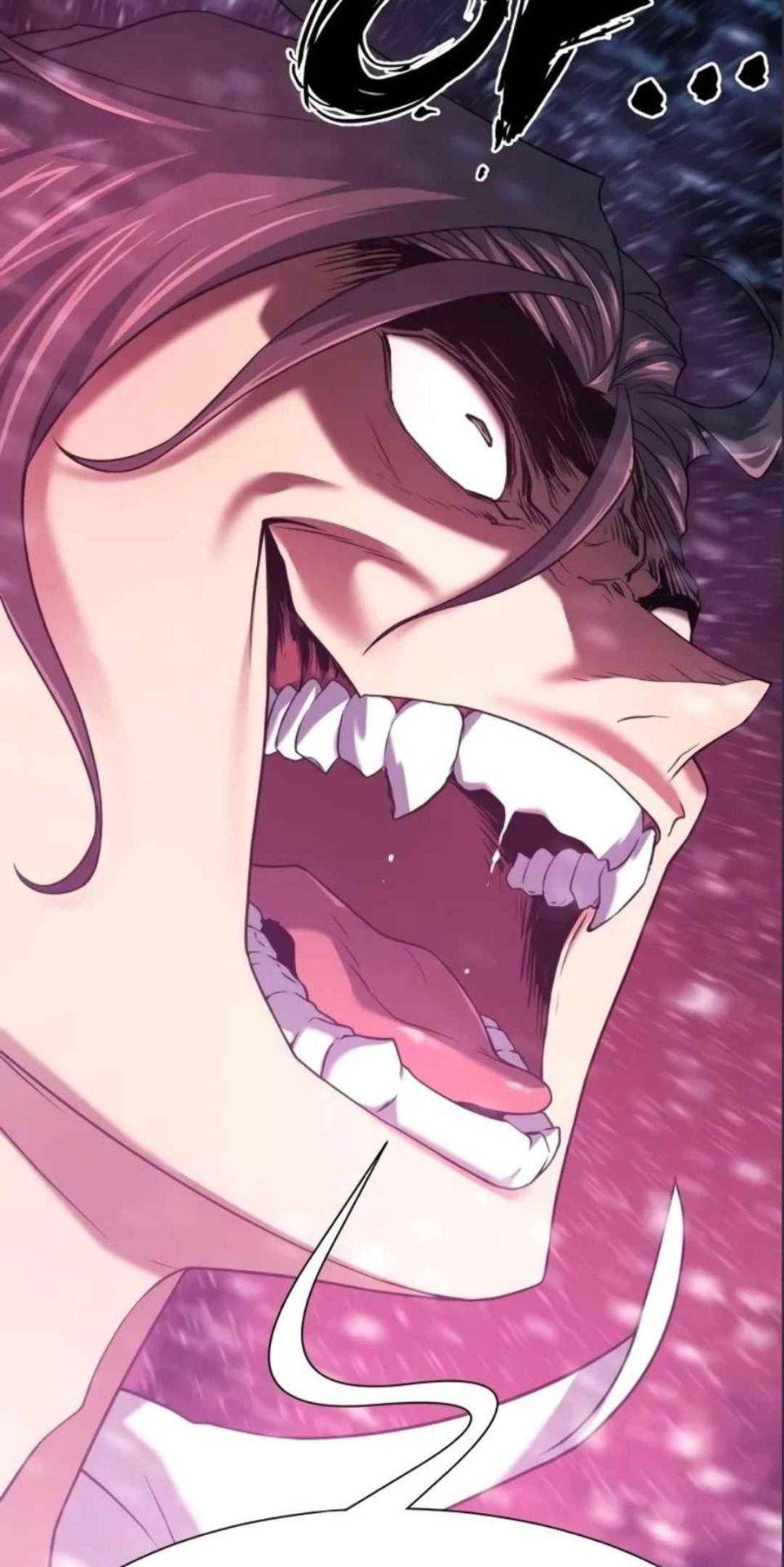
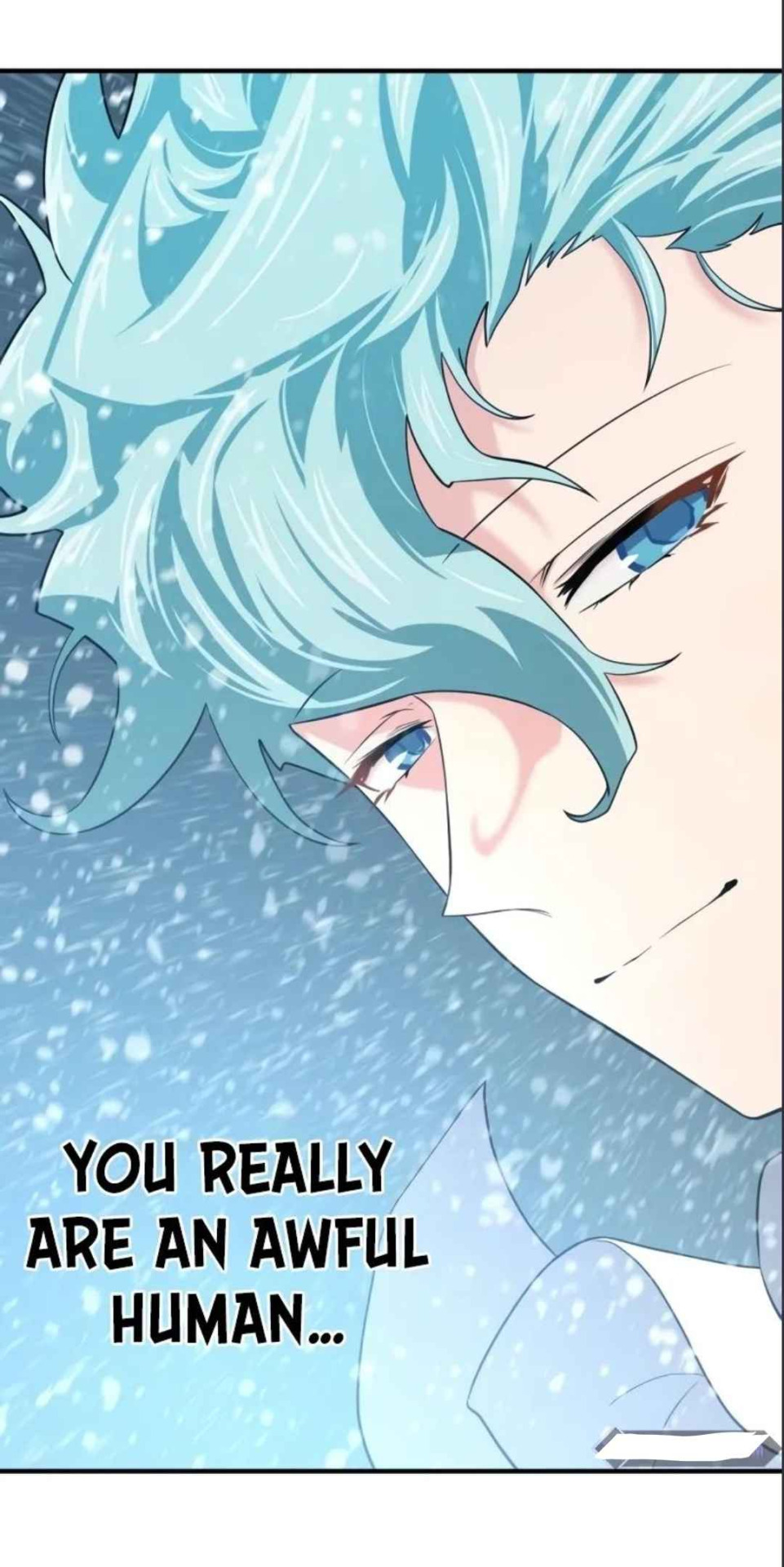
HE IS LOOKING AT HIM SO DAMN FONDLY. WHAT THE FUCK. THERE IS WARMTH IN THAT GAZE I SWEAR TO GOD IM NOT CRAZY. "you're such a terrible person" AND HES LOOKING AT HIM LIKE THAT. WHAT. WHAT. WHAT. crazy. CRAZY.
the adaptor knew what they were doing . i swear it . like "yeah thats MY evil boyf. he's back to being evil and lively and his perfect bastard self." I SWEAR IT I SWEAR IM NOT CRAZY
this is proof of llovier. im so serious dont even joke lads
back to the top!
not much to say here lloyds expression is just so real sobs yeah . yeah,,, older gens having goofy ass back and forths over things that really arent the main issue here is universal

like i dont quite remember what season theyre in now but its past winter by this point and based on the two panels showing the time of day they had to have been arguing about this for AT LEAST FOUR HOURS 😭 LIKE WHAT THE FUCK (idk how accurate that estimate is im notoriously bad at time but still. a long fucking time) these BUFFOONS
also lloyd being dramatic as hell is so fucking silly HAHAHAHAHHAA



AND THEN THE LORDS FUCKING STARING AT HIM WHEN HE BRINGS UP THAT HE HAS AN IDEA. HELPPP all eyes on lloyd now !!! what brilliant idea do u have next thats absolutely totally not secured through lowkey social engineering!
so so SO happy w how confident he looks here heehee :3 whats with the pose tho lol is that a reference? maybe?

anyway they plan to make a train thru the pantara mountains? vantara? pan,,, idk what the correct translation is ive seen vantara and pantara
also lloyd just knowing exactly how to talk to those old ass political lords and understanding how to string them along idk what it is but i really really like that, it makes sense to me personally

i figure that thats probably something suho just Had to pay attention to back in korea, idk how korean politics works exactly but i imagine the principle of "person in charge can make or break a lot of things" still stands
so like it'd make sense that he pays attention to whoevers in charge of the finance stuff, which political figures care about money, and where that money goes, bc if they fuck with the funds for education thatll directly screw him over. idk if korea has financial aid but whatever equivalent that is that allows suho to get scholarships n stuff so he can stay afloat, if someone comes into power that will negatively affect his odds of getting that funding, he'll need to know and prepare! though maybe this is reaching a little too deep it might not be That Serious lmfao
again i really like how many of these confident / plotting expressions have been showing up IM SOO SO SO HAPPYYYY my schemer my little scheming guy he's BACK HES BACK
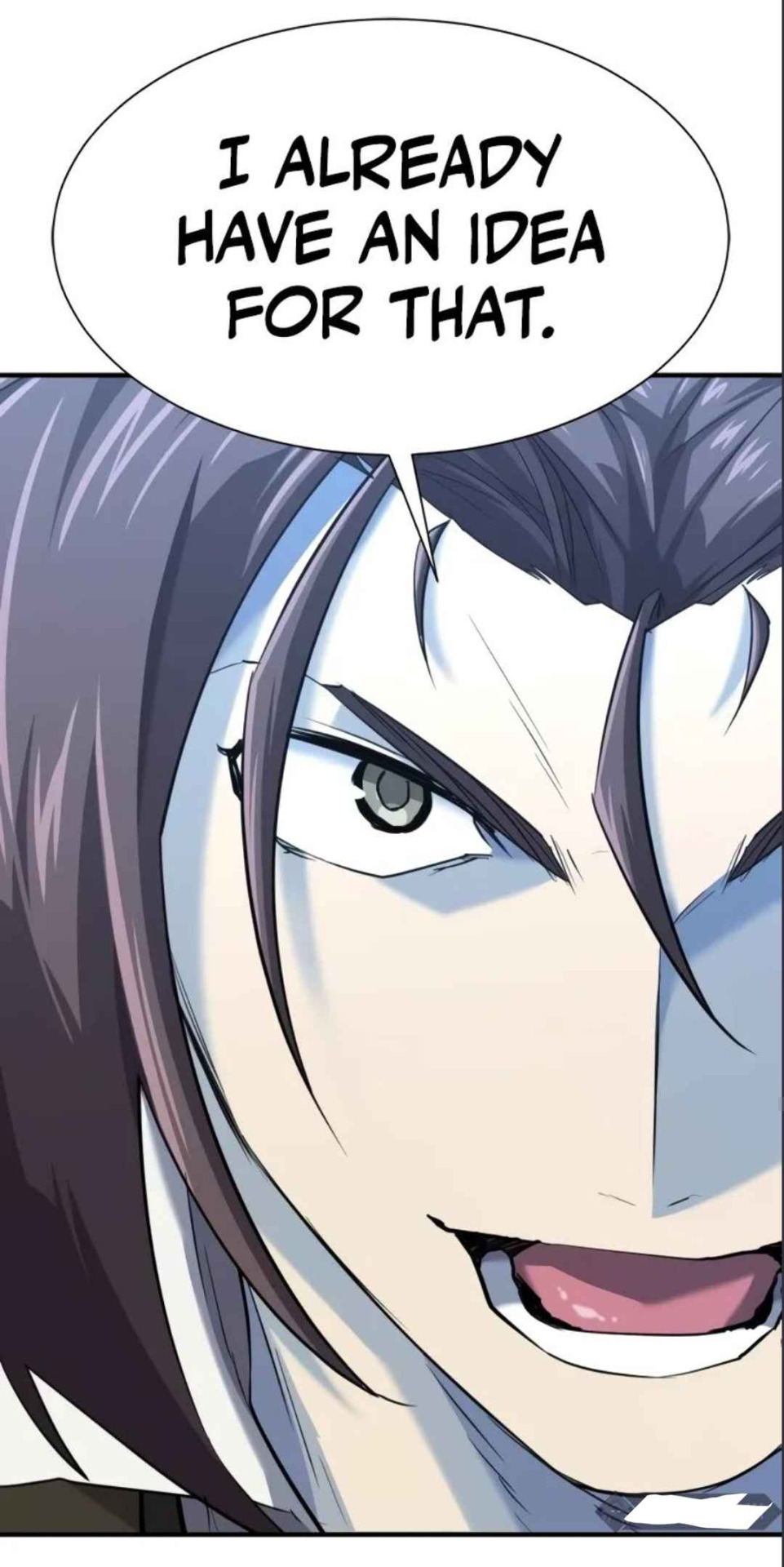
the two of them also look really really nice here in these two panels for some reason. i think im going crazy. i dont know why i like these panels its just. !??!?!?!?!??! like javiers hair is completely messy but idk i just ?!?!?!?!? im completely aro so its not like an attraction or anything but idk!?!??!?!?!

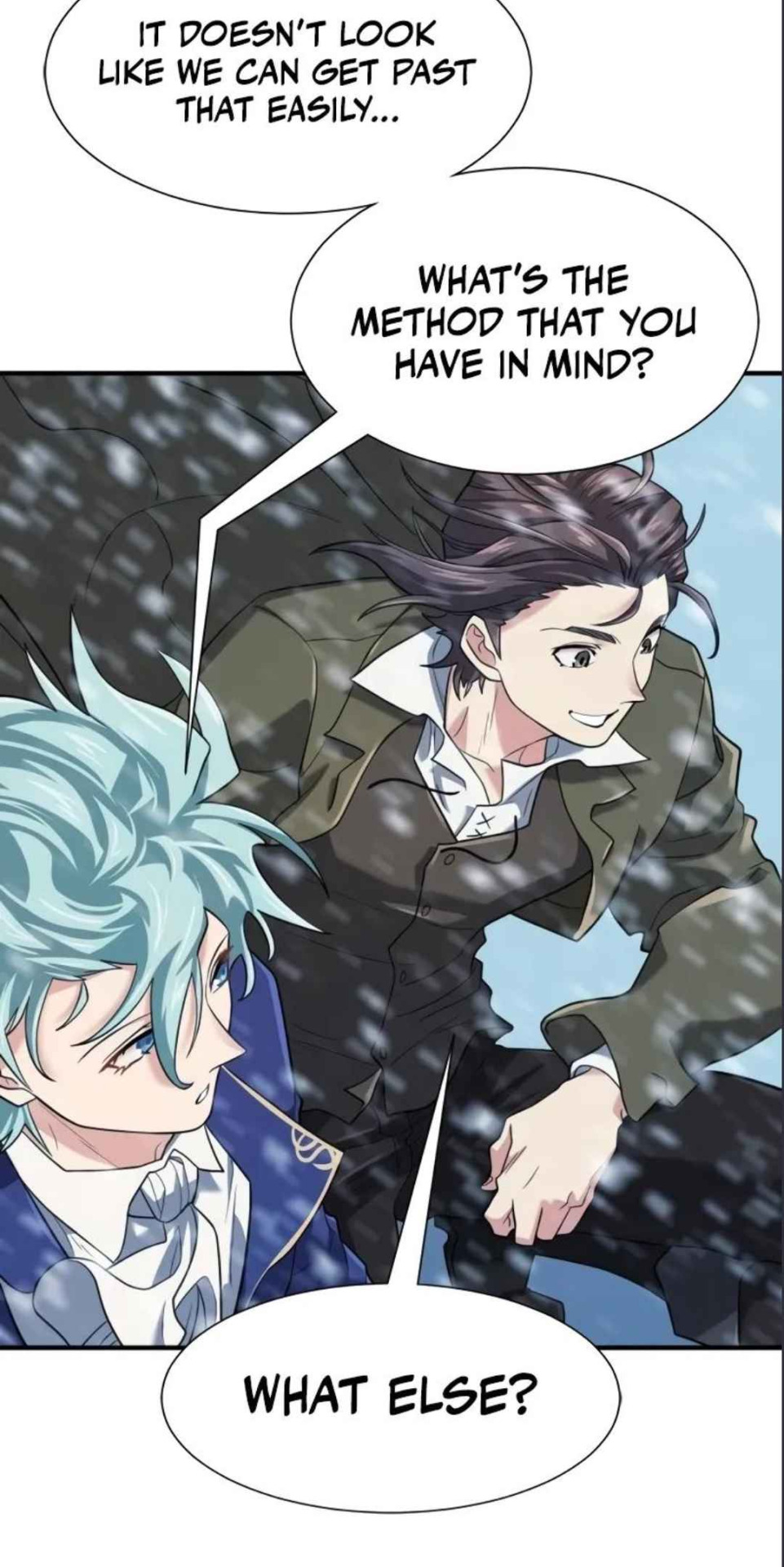
finally our first look at the overworld demons!!! these two kiddos seem super cute i really hope they dont . misunderstand or anything and that lloyd and javier can have some fun and heartwarming moments with them,,,, more sillies and soft fluff please!!!!! thats all i ask!!!!

okay that's all! not much to say this episode is just really really cozy to me. ok well as cozy as "lloyd frontera making evil expressions" can get LMFAO it feels like build up into the next section and im really excited to see what he's gonna do with this train idea and with the overworld demons...!!!!!
there was a notice at the end of the ep that the artist is taking a small break for their health so no ep next week, but there'll be one the week after i believe. we must be patient!!! rest well artist!!!!
that's it ill see yall in. two weeks? ill probably have some other yap post for the hiatus week idk, it depends on how my schoolwork goes. see yall then!!!!
#tged#the greatest estate developer#tged spoilers#the greatest estate designer#lynn misc#lloyd frontera#javier asrahan#surprisingly i dont have much to say in the tags#usually i have bonus thoughts in here but whatever bonus thought i had planned for this week has simply. evaporated#so i guess the thoughts about me wondering what that original thought was will have to suffice#seriously what was it???#was it about school?? ehh i dont wanna complain too much abt school here#eh must not have been important <- probably something i was really excited to tell but also completely slipped my mind#whatever ill post now lol
45 notes
·
View notes
Text
In honor of a certain two hobbits' birthday
I thought I'd share Tolkien's letter #214 in its entirety. It's long for a Tumblr post, but fascinating. Hobbit inheritance laws, several interesting women-hobbits, whole paragraphs on hobbit gift-giving traditions and why Gollum (of hobbit-kind) expected to be given a gift on his birthday instead of giving them to others. And that's without getting into the Agatha Christie-worthy story that is Lalia the Great (or Fat).
If you like this stuff but haven't dug into this particular corner of the lore, I hope you enjoy.
214 To A. C. Nunn (draft)
[A reply to a reader who pointed out an apparent contradiction in The Lord of the Rings: that in the chapter 'A Long-expected Party' it is stated that 'Hobbits give presents to other people on their own birthdays'; yet Gollum refers to the Ring as his 'birthday present', and the account of how he acquired it, in the chapter 'The Shadow of the Past', indicates that his people received presents on their birthdays. Mr Nunn's letter continued: 'Therefore, one of the following must be true: (1) Sméagol's people were not "of hobbit-kind" as suggested by Gandalf (I p. 62); (2) the Hobbit custom of giving presents was only a recent growth; (3) the customs of the Stoors [Sméagol-Gollum's people] differed from those of other Hobbits; or (5) [sic] there is an error in the text. I shall be most grateful if you can spare the time to undertake some research into this important matter.]
[Not dated; probably late 1958-early 1959.]
Dear Mr Nunn,
I am not a model of scholarship; but in the matter of the Third Age I regard myself as a 'recorder' only. The faults that may appear in my record are, I believe, in no case due to errors, that is statements of what is not true, but omissions, and incompleteness of information, mostly due to the necessity of compression, and to the attempt to introduce information en passant in the course of narrative which naturally tended to cut out many things not immediately bearing on the tale.
In the matter of birthday-customs and the apparent discrepancies that you note, we can therefore, I think, dismiss your alternatives (1) and (5). You omit (4).
With regard to (1) Gandalf certainly says at first 'I guess' p. 62; but that is in accordance with his character and wisdom. In more modern language he would have said 'I deduce', referring to matters that had not come under his direct observation, but on which he had formed a conclusion based on study. (You will observe in the Appendix B that the Wizards did not come until shortly before the first appearance of Hobbits in any records, at which time they were already divided into three marked branches.) But he did not in fact doubt his conclusion 'It is true all the same, etc.' p. 63.
Your alternative (2) would be possible; but since the recorder says on p. 35 Hobbits (which he uses whatever its origin, as the name for the whole race), and not the Hobbits of the Shire, or Shire-folk, it must be supposed that he means that the custom of giving presents was in some form common to all varieties, including Stoors. But since your (3) is naturally true, we might expect even so deep-rooted a custom to be exhibited in rather different ways in different branches. With the remigration of the Stoors back to Wilderland in TA 1356, all contact between this retrograde group and the ancestors of the Shirefolk was broken. More than 1100 years elapsed before the Déagol-Sméagol incident (c. 2463). At the time of the Party in TA 3001, when the customs of the Shire-folk are cursorily alluded to insofar as they affect the story, the gap of time was nearly 1650 years.
All Hobbits were slow to change, but the remigrant Stoors were going back to a wilder and more primitive life of small and dwindling[1] communities; while the Shire-folk in the 1400 years of their occupation had developed a more settled and elaborate social life, in which the importance of kinship to their sentiment and customs was assisted by detailed traditions, written and oral.
Though I omitted any discourse on this curious but characteristic fact of their behaviour, the facts concerning the Shire could be set out in some detail. The riverside Stoors must, naturally, remain more conjectural.
'Birthdays' had a considerable social importance. A person celebrating his/her birthday was called a ribadyan (which may be rendered according to the system described and adopted a byrding). The customs connected with birthdays had, though deeply rooted, become regulated by fairly strict etiquette; and so in consequence were in many cases reduced to formalities: as indeed suggested by 'not very expensive ones as a rule' p. 35; and especially by p. 46 11. 20-26. With regard to presents: on his birthday the 'byrding' both gave and received presents; but the processes were different in origin, function, and etiquette. The reception was omitted by the narrator (since it does not concern the Party) but it was in fact the older custom, and therefore the one most formalized. (It does concern the Sméagol-Déagol incident, but the narrator, being obliged to reduce this to its most significant elements, and to put it into the mouth of Gandalf talking to a hobbit, naturally made no comment on a custom which the hobbit (and we) should regard as natural in connexion with birthdays.)
Receiving of gifts: this was an ancient ritual connected with kinship. It was in origin a recognition of the byrding's membership of a family or clan, and a commemoration of his formal 'incorporation'.[2] No present was given by father or mother to their children on their (the children's) birthdays (except in the rare cases of adoption); but the reputed head of the family was supposed to give something, if only in 'token'.
Giving gifts: was a personal matter, not limited to kinship. It was a form of 'thanksgiving', and taken as a recognition of services, benefits, and friendship shown, especially in the past year.
It may be noted that Hobbits, as soon as they became 'faunts' (that is talkers and walkers: formally taken to be on their third birthday-anniversary) gave presents to their parents. These were supposed to be things 'produced' by the giver (that is found, grown, or made by the 'byrding'), beginning in small children with bunches of wild flowers. This may have been the origin of the 'thanksgiving' presents of wider distribution, and the reason why it remained 'correct' even in the Shire for such presents to be things belonging to or produced by the giver. Samples of the produce of their gardens fields or workshops remained the usual 'gifts given', especially among the poorer Hobbits.
In the Shire etiquette, at the date of the Party, 'expectation of receiving' was limited to second cousins or nearer kin, and to residence within 12 miles.[3] Even close friends (if unrelated) were not 'expected' to give, though they might. The Shire residence-limit was obviously a fairly recent result of the gradual break-up of kinship communities and families and dispersal of relatives, under long-settled conditions. For the received birthday presents (no doubt as a relic of the customs of small ancient families) must be delivered in person, properly on the eve of the Day, and at latest before nuncheon on the Day. They were received privately by the 'byrding'; and it was very improper to exhibit them separately or as a collection – precisely to avoid such embarrassments as may occur in our wedding-exhibitions (which would have horrified the Shirefolk).[4] The giver could thus accommodate his gift to his purse and his affections without incurring public comment or offending (if anyone) any other than the recipient. But custom did not demand costly presents, and a Hobbit was more readily flattered and delighted by an unexpectedly 'good' or desirable present than offended by a customary token of family good-will.
A trace of this can be seen in the account of Sméagol and Déagol – modified by the individual characters of these rather miserable specimens. Déagol, evidently a relative (as no doubt all the members of the small community were), had already given his customary present to Sméagol, although they probably set out on their expedition v. early in the morning. Being a mean little soul he grudged it. Sméagol, being meaner and greedier, tried to use the 'birthday' as an excuse for an act of tyranny. 'Because I wants it' was his frank statement of his chief claim. But he also implied that D's gift was a poor and insufficient token: hence D's retort that on the contrary it was more than he could afford.
The giving of presents by the 'byrding' – leaving out of account the gifts to parents,[5] mentioned above — being personal and a form of thanks, varied much more in form in different times and places, and according to the age and status of the 'byrding'. The master and mistress of a house or hole, in the Shire, would give gifts to all under their roof, or in their service, and usually also to near neighbours. And they might extend the list as they pleased, remembering any special favours in the past year. It was understood that the giving of presents was not fixed by rule ; though the withholding of a usual gift (as e.g. to a child, a servant, or a next door neighbour) was taken as a rebuke and mark of severe displeasure. Juniors & Inmates (those having no house of their own) were under no such obligations as rested on householders; but they usually gave presents according to their means or affections. 'Not very expensive as a rule' – applied to all the gifts. Bilbo was in this as in other ways an exceptional person, and his Party was a riot of generosity even for a wealthy Hobbit. But one of the commonest birthday ceremonies was the giving of a 'party' – in the evening of the Day. All those invited were given presents by the host, and expected them, as part of the entertainment (if secondary to the fare provided). But they did not bring presents with them. Shire-folk would have thought that very improper. If the guests had not already given a gift (being one of those required to do so by kinship), it was too late. For other guests it was a thing 'not done' – it looked like paying for the party or matching the party-gift, and was most embarrassing. Sometimes, in the case of a very dear friend unable to come to a party (because of distance or other causes) a token invitation would be sent, with a present. In that case the present was always something to eat or drink, purporting to be a sample of the party-fare.
I think it will be seen that all the details recorded as 'facts' do actually fit into a definite picture of sentiment and custom, though this picture is not sketched even in the incomplete fashion of this note. It could, of course, have appeared in the Prologue: e.g. in the middle of p. 12. But though I cut out a great deal, that Prologue is still too long and overloaded according even to those critics who allow that it has some use, and do not (as some) advise readers to forget it or skip it.
Incomplete as it is, this note may seem to you much too long; and though you asked for it, more than you asked for. But I do not see how I could have answered your queries more shortly in a way suitable to the compliment you pay me by taking an interest in Hobbits sufficient to mark the lacuna in the information provided.
However, the giving of information always opens still further vistas; and you will no doubt see that the brief account of 'presents' opens yet more anthropological matters implicit to such terms as kinship, family, clan, and so on. I venture to add a further note on this point, lest, in considering the text in the light of my reply, you should feel inclined to enquire further about Sméagol's 'grandmother', whom Gandalf represents as a ruler (of a family of high repute, large and wealthier than most, p. 62) and even calls a 'matriarch' (p. 66).
As far as I know Hobbits were universally monogamous (indeed they very seldom married a second time, even if wife or husband died very young); and I should say that their family arrangements were 'patrilinear' rather than patriarchal. That is, their family names descended in the male-line (and women were adopted into their husband's name); also the titular head of the family was usually the eldest male. In the case of large powerful families (such as the Tooks), still cohesive even when they had become very numerous, and more what we might call clans, the head was properly the eldest male of what was considered the most direct line of descent. But the government of a 'family', as of the real unit: the 'household', was not a monarchy (except by accident). It was a 'dyarchy', in which master and mistress had equal status, if different functions. Either was held to be the proper representative of the other in the case of absence (including death). There were no 'dowagers'. If the master died first, his place was taken by his wife, and this included (if he had held that position) the titular headship of a large family or clan. This title thus did not descend to the son, or other heir, while she lived, unless she voluntarily resigned.[6] It could, therefore, happen in various circumstances that a long-lived woman of forceful character remained 'head of the family', until she had full-grown grandchildren.
Laura Baggins (née Grubb) remained 'head' of the family of 'Baggins of Hobbiton', until she was 102. As she was 7 years younger than her husband (who died at the age of 93 in SY 1300), she held this position for 16 years, until SY 1316; and her son Bungo did not become 'head', until he was 70, ten years before he died at the early age of 80. Bilbo did not succeed, until the death of his Took mother. Belladonna, in 1334, when he was 44.
The Baggins headship then, owing to the strange events, fell into doubt. Otho Sackville-Baggins was heir to this title – quite apart from questions of property that would have arisen if his cousin Bilbo had died intestate; but after the legal fiasco of 1342 (when Bilbo returned alive after being 'presumed dead') no one dared to presume his death again. Otho died in 1412, his son Lotho was murdered in 1419, and his wife Lobelia died in 1420. When Master Samwise reported the 'departure over Sea' of Bilbo (and Frodo) in 1421, it was still held impossible to presume death; and when Master Samwise became Mayor in 1427, a rule was made that: 'if any inhabitant of the Shire shall pass over Sea in the presence of a reliable witness, with the expressed intention not to return, or in circumstances plainly implying such an intention, he or she shall be deemed to have relinquished all titles rights or properties previously held or occupied, and the heir or heirs thereof shall forthwith enter into possession of these titles, rights, or properties, as is directed by established custom, or by the will and disposition of the departed, as the case may require.' Presumably the title of 'head' then passed to the descendants of Ponto Baggins – probably Ponto (II).
A well-known case, also, was that of Lalia the Great (or less courteously the Fat). Fortinbras II, one time head of the Tooks and Thain, married Lalia of the Clayhangers in 1314, when he was 36 and she was 31. He died in 1380 at the age of 102, but she long outlived him, coming to an unfortunate end in 1402 at the age of 119. So she ruled the Tooks and the Great Smials for 22 years, a great and memorable, if not universally beloved, 'matriarch'. She was not at the famous Party (SY 1401), but was prevented from attending rather by her great size and immobility than by her age. Her son, Ferumbras, had no wife, being unable (it was alleged) to find anyone willing to occupy apartments in the Great Smials, under the rule of Lalia. Lalia, in her last and fattest years, had the custom of being wheeled to the Great Door, to take the air on a fine morning. In the spring of SY 1402 her clumsy attendant let the heavy chair run over the threshold and tipped Lalia down the flight of steps into the garden. So ended a reign and life that might well have rivalled that of the Great Took.
It was widely rumoured that the attendant was Pearl (Pippin's sister), though the Tooks tried to keep the matter within the family. At the celebration of Ferumbras' accession the displeasure and regret of the family was formally expressed by the exclusion of Pearl from the ceremony and feast; but it did not escape notice that later (after a decent interval) she appeared in a splendid necklace of her name-jewels that had long lain in the hoard of the Thains.
Customs differed in cases where the 'head' died leaving no son. In the Took-family, since the headship was also connected with the title and (originally military) office of Thain,[7] descent was strictly through the male line. In other great families the headship might pass through a daughter of the deceased to his eldest grandson (irrespective of the daughter's age). This latter custom was usual in families of more recent origin, without ancient records or ancestral mansions. In such cases the heir (if he accepted the courtesy title) took the name of his mother's family – though he often retained that of his father's family also (placed second). This was the case with Otho Sackville-Baggins. For the nominal headship of the Sackvilles had come to him through his mother Camellia. It was his rather absurd ambition to achieve the rare distinction of being 'head' of two families (he would probably then have called himself Baggins-Sackville-Baggins) : a situation which will explain his exasperation with the adventures and disappearances of Bilbo, quite apart from any loss of property involved in the adoption of Frodo.
I believe it was a moot-point in Hobbit lore (which the ruling of Mayor Samwise prevented from being argued in this particular case) whether 'adoption' by a childless 'head' could affect the descent of the headship. It was agreed that the adoption of a member of a different family could not affect the headship, that being a matter of blood and kinship; but there was an opinion that adoption of a close relative of the same name[8] before he was of age entitled him to all privileges of a son. This opinion (held by Bilbo) was naturally contested by Otho.
There is no reason to suppose that the Stoors of Wilderland had developed a strictly 'matriarchal' system, properly so called. No trace of any such thing was to be found among the Stoor-element in the Eastfarthing and Buckland, though they maintained various differences of custom and law. Gandalf's use (or rather his reporter and translator's use) of the word 'matriarch' was not 'anthropological', but meant simply a woman who in fact ruled the clan. No doubt because she had outlived her husband, and was a woman of dominant character.
It is likely enough that, in the recessive and decadent Stoor-country of Wilderland, the women-folk (as is often to be observed in such conditions) tended to preserve better the physical and mental character of the past, and so became of special importance. But it is not (I think) to be supposed that any fundamental change in their marriage-customs had taken place, or any sort of matriarchal or polyandrous society developed (even though this might explain the absence of any reference whatever to Sméagol-Gollum's father). 'Monogamy' was at this period in the West universally practised, and other systems were regarded with repugnance, as things only done 'under the Shadow'.
I actually started this letter nearly four months ago; but it never got finished. Shortly after I received your enquiries my wife, who had been ill most of 1958, celebrated the return of health by a fall in the garden, smashing up her left arm so badly that she is still crippled and in plaster. So 1958 was an almost completely frustrated year, and with other troubles, and the imminence of my retirement involving many rearrangements, I have had no time at all to deal with the Silmarillion. Much though I wish to do so (and, happily, Allen and Unwin also seem to wish me to do).
[1] Between 2463 and the beginning of Gandalf's special enquiries concerning the Ring (nearly 500 years later) they appear indeed to have died out altogether (except, of course, for Sméagol); or to have fled from the shadow of Dol Guldur.
[2] Anciently this apparently took place, shortly after birth, by the announcement of the name of the child to the family assembled, or in larger more elaborate communities to the titular 'head' of the clan or family. See note at end.
[3] Hence the Hobbit expression 'a twelve-mile cousin' for a person who stickled for the law, and recognized no obligations beyond its precise interpretation: one who would give you no present if the distance from his doorstep to yours was not under 12 miles (according to his own measurement).
[4] No presents were given at or during the celebration of Hobbit weddings, except flowers (weddings were mostly in Spring or early Summer). Assistance in furnishing a home (if the couple were to have a separate one, or private apartments in a Smial) was given long before by the parents on either side.
[5] In more primitive communities, as those still living in clan-smials, the byrding also made a gift to the 'head of the family'. There is no mention of Sméagol's presents. I imagine that he was an orphan; and do not suppose that he gave any present on his birthday, save (grudgingly) the tribute to his 'grandmother'. Fish probably. One of the reasons, maybe, for the expedition. It would have been just like Sméagol to give fish, actually caught by Déagol!
[6] We are here dealing only with titular 'headship' not with ownership of property, and its management. These were distinct matters; though in the case of the surviving 'great households', such as Great Smials or Brandy Hall, they might overlap. In other cases, headship, being a mere title, and a matter of courtesy, was naturally seldom relinquished by the living.
[7] This title and office descended immediately, and was not held by a widow. But Ferumbras, though he became Thain Ferumbras III in 1380, still occupied no more than a small bachelor-son's apartment in the Great Smials, until 1402.
[8] descendants of a common great-grandfather of the same name.
#tolkien#lord of the rings#lalia the fat#hobbits#bilbo baggins#i thoroughly intended to shorten this up and focus on the story of lalia which i really do have a soft spot for#but i am tired and also why would i want to deprive you of the joy that is this.... *gestures*
40 notes
·
View notes
Text
found this in my drafts enjoy
Monsters - Upperclasmen things that I want to talk about more
Aaron/Dan - Both of whom grew in absolutely shitty situations but I find interesting is how they respond to their upbrings. Both of them are desperate to make something of themselves Dan through the foxes and Aaron through becoming a doctor. But like they both respond very differently to those backgrounds. Dan despite being an ex-stripper seems distinctly unashamed whereas Aaron was literally against joining the foxes bc he didn't want anyone to know about his background and be associated with the foxes. Both them fall in love with someone Matt&Katelyn respectively and hate it bc it goes against their life plan. Dan falling for Matt against all odds, Aaron loving Katelyn despite Andrew. Dan leaving behind her shitty aunt and never seeking with her again vs Aaron still loving Tilda and agreeing to the deal with Andrew even though he hates it bc he wants Andrew around. That bit where Neil says Aaron survived this long on "Willpower and Desperation" fits pre-canon Dan so well.
Matt/Andrew - A lot of people focus on them both being SA surviors which is true but I think how they view themselves have a lot similarties as well. Andrew only living to protect other people when we see in canon andrew defining himself by being a protector vs Matt literally being born to "fix" his parents divorce and his drug addiction starting as a way to fix his relationship with with his dad like theres something there!!
Allison/Nicky - Them both having issues with boundaries bc boundaries/rules have been used against them their whole live. Luther and Maria restricting Nicky's sexuality, personality, who he is and sending him to conversion camp. Allison developing an eating disorder to keep up with her parents demands and later getting cut off when she she doesn't listen to their rules, etc. They both have their own masks that they use to test people and as a coping mechanism. Allison's whole catty bitch nothing affects me act bc of how much the press/and her parents hurt her Nicky being out and proud as response to a lifetime of constant homophobia !!
Renee&Neil - The name changes!!! Natalie and Nathaniel. Them both having aversions to knives bc of their pasts but that view changing bc of Andrew. Renee acting as witness against her former gang and Neil selling out his father's empire. The two killers on the team who have never been caught. It's canon that Neil can tell Renee's past is darker than she seems which is why its so wary but also what about Renee feeling the same thing. Renee seeing Neil and being reminded of who she used to be does that make it harder or easier to be around neil? I have a feeling they could dig up each other's demons and I like that a lot.
Kevin and Seth - Oooof this dynamic is highly underexplored. Like Neil assumes Seth is jealous of Kevin in the beginning and while that might be true dismissing it a jealousy feels like a bit of shallow reading. Seth was one of the original foxes from Wymack's line the only fifth year wheras Kevin is Wyamck's son who was never supposed to be fox material but is here anyways. Kevin sees Seth as like a waste of a scholarship and Seth knows it. Like Seth is a failure and self-sabotages while Kevin is a huge perfectionist whose high standards are detrimental to everyone. Their such opposites it's so interesting to me. Maybe its just me but I feel like Seth's issue w/Kevin comes from the fact that he doesn't really see Kevin as a fox. Kevin is respected, adored and has money, influence and support that the foxes don't have. Random strangers literally crying bc Kevin might never play again and Seth's own mom not even picking up his ashes did his brothers even show up to his funeral??
#the foxhole court#all for the game#tfc#aftg#dan wilds#nicky hemmick#allison reynolds#renee walker#andrew minyard#aaron minyard#neil josten#kevin day#seth gordon#matt boyd#sunny3.txt
31 notes
·
View notes
Note
Going to be diseased about the modern au jopson/little/tozer idea forever. Legit sounds like the perfect story omg. There’s so much potential that I actually can’t stop thinking about it and now I want to know all the little details on how they would all interact,,
(Also if you somehow haven’t already then I’d highly recommend reading Renovation by ktula on ao3 - similar broad premise but very different details.
I was going to just say this all as a comment but I got shy lol but regardless! Very good concept, your mind is so massive for it tbh)
Omg!!! I was 100% inspired by ktula’s Renovation! I just read it last week and it’s all I can think about for real!! That fic rewired something in my brain, legitimately. I didn’t realize how much I was into Sol until I read it - he’s just so rough I need him to top me ASAP.
You don't have to feel shy! I'm just a dumb nerd who likes to think about cold boys warming up together :) say hi any time!
ANYWAY I loooove all of their dynamics so much. i have thought about this A LOT so here's way more details!!!!!!
[[PART 1]]
Nepo baby Nedward comes from a big family with lots of money. He works hard but he’s so shy and sad he couldn’t have gotten where he’s gotten (idk maybe something in finance?) without that Oxford legacy admissions because he’s such a big mopey doofus otherwise. And he’s quite ashamed of it, really, because he recognized his privilege but he can’t help it. And he’s a little out of touch because of it all but trying his best. But when grandma died no one else wanted the (modest but now, with real estate prices like they are, quite fancy) Victorian house because it’s practically falling apart, so it’s his now.
Jopson obviously also went to Oxford but on scholarship and had to work his ass off for it. He learned how to put on a wealthy affect to blend in with all the rich kids. But none of them liked him except Ned, who trailed around after him like a morose puppy begging for scraps of attention. And it pissed Tom off so much at first but eventually he realized he liked Ned - a lot actually. And he likes being in control, which is what Ned needs more than anything. And the rest is history! He’s perhaps some sort of organizer for housing justice. He’s home when he’s not yelling at city council for their proposed cheap developments that will displace entire city blocks of people for years.
(I think perhaps they’re not actually married yet. Tom doesn’t believe in marriage. He watched his father leave his mother and he’s watched too many “good men” leave her subsequently. But he and Ned make a show of it like they are - of course the Littles are less than thrilled that their only son is gay and seriously dating some kind of activist.)
Sol….. poor Sol…. He’s down on his luck for sure (not as bad as he is in ktula’s fic but still). He has a tendency of mixing business with pleasure, which really screwed him over when his former coworkers (and lovers) turned on him. It’s tough being queer in construction. So he lost his job, and now he’s taking odd jobs to do electrical work, but he’s certified for much much more than that.
Sol is also a sex fiend!!! He can’t help it, honestly, it’s just his nature. And the dry spell is killing him, but he knows he has to stay focused and snag this opportunity to work on this big beautiful house. But it’s soooo difficult because Nedward is 100% his type and his cute little husband isn’t bad either, even if he is a little unnerving. And he's constantly putting his foot in his mouth by accidentally saying something stupid and horny but it always makes Tom's eyes go dark and Ned turn a glorious pink so he keeps doing it.
At first Sol thinks Tom doesn’t trust him - his work (other than electrical) isn’t insured, since he’s not with a company, and Tom seems to know enough about housing to know that might be a bad idea. But he’s certainly cute, and he’s always buying Sol lunch from the chippie and asking him what kind of music he wants Tom to put on and eventually Sol thinks they’re maybe friends. But, by god, he’s always walking around looking like a snack in those tight, too small t shirts and booty shorts showing off the dark hair on his thighs and belly. And when he catches Sol looking he always responds with the most indecipherable, sultry expression that goes straight to Sol's cock - this environment is NOT conducive to GETTING WORK DONE. He goes home every day and jerks off thinking about what Tom and Ned might look like in bed together.
And don't get me started on Ned - he's an absolute mess of a man. He's big and a rough around the edges, obviously, but so well mannered and polite at the same time. He's always trying (and failing) to butch it up for Sol - he invites Sol to watch sports (working men like sports, right?) and drink a beer (men like Sol drink beer, right?), and maybe barbeque when the garden is finished (come on - grilling meat and drinking beer... right? Right?). And it's so misguided and silly but Sol finds it totally endearing, especially the time when Ned super excitedly offers him the most disgusting oatmeal stout he's ever had the displeasure of drinking, and so they both end up having some of Tom's Cab Sav instead. And then, of course, Sol wants to talk about notes and wine pairings with Tom and Ned goes the most alluring shade of scarlet because he's spent so much time and energy going down the WRONG avenues to woo Sol.
And Sol doesn't know this until later, but Ned gets off so hard after the fact when Tom teases him mercilessly about making a fool of himself in front of Sol. He absolutely gets a shame boner any time he embarrasses himself, and it gets so much worse (better) when Sol and Tom start screwing because it makes Ned feel like a voyeur and a pervert. He loves hearing all the titillating details of their salacious affair. Of course Tom knows all of this and completely milks it. His favorite thing to do is drive Ned into a mild moral panic. And it's just too easy easy with regard to Sol.
#joplitzer#thomas jopson#solomon tozer#edward little#What do the kids call it?#shame nedward little power hour?#victorian house AU
30 notes
·
View notes
Text

🕷️Catch You On The Web!!🕸️
An Itafushi spiderman socmed au ❤️
In which Yuuji Itadori, newly a sophomore in college who still has not a clue what he wants to do with his life, gets bitten by a radioactive spider and gains new abilities, stats and powers. He's coasting on his raw athletic ability, a full-ride scholarship handed to him despite his less-than-perfect grades, when he realizes he's got way more ahead of him than he'd ever imagined. Including, but not limited to, a newfound crush that also throws him for a loop.
you are reading:
Prologue | Part 1 | Part 1.5 | Part 2 | Part 3
notes:
Relatively short part today 🙂↕️ but MEGUMI NEXT PART TRUSTTT - also, all texts are from yuuji's pov !!



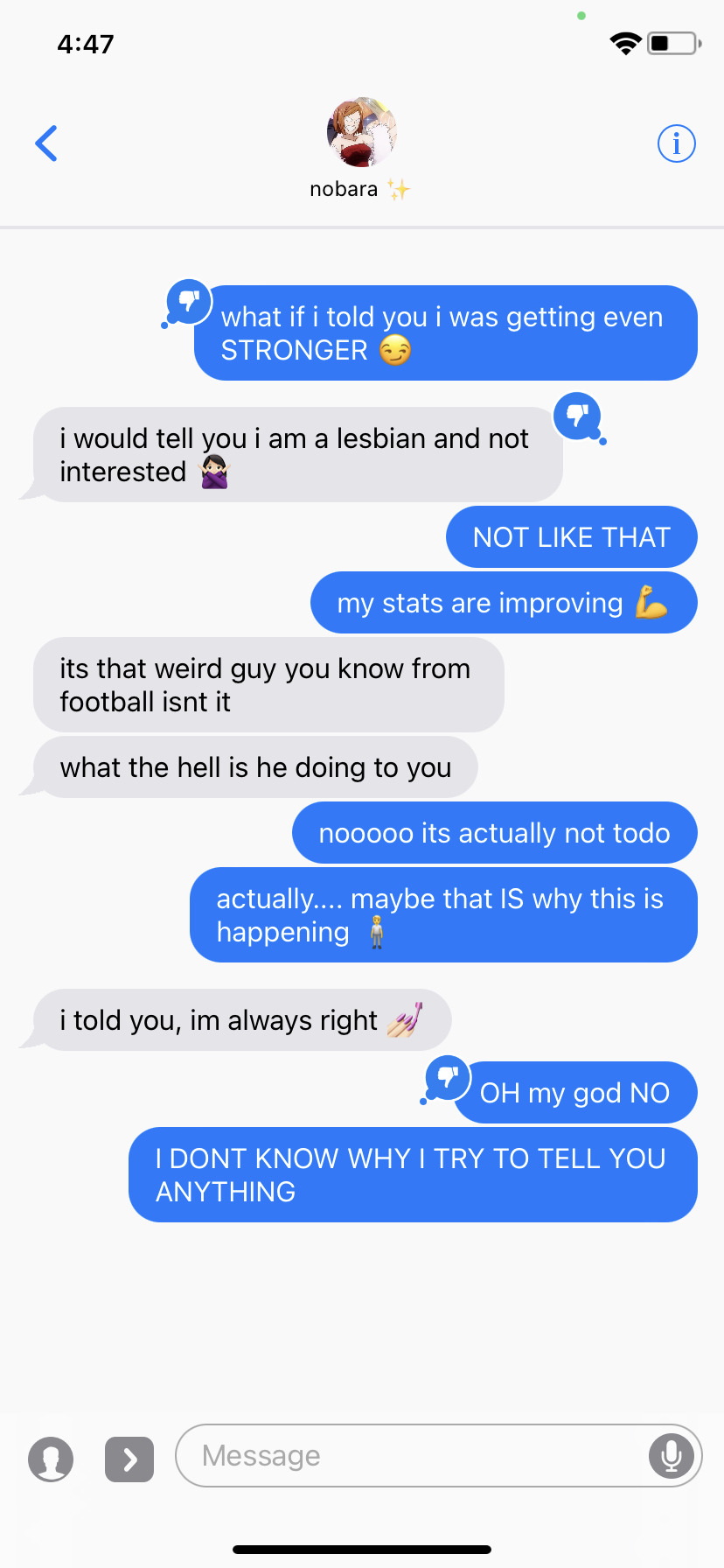
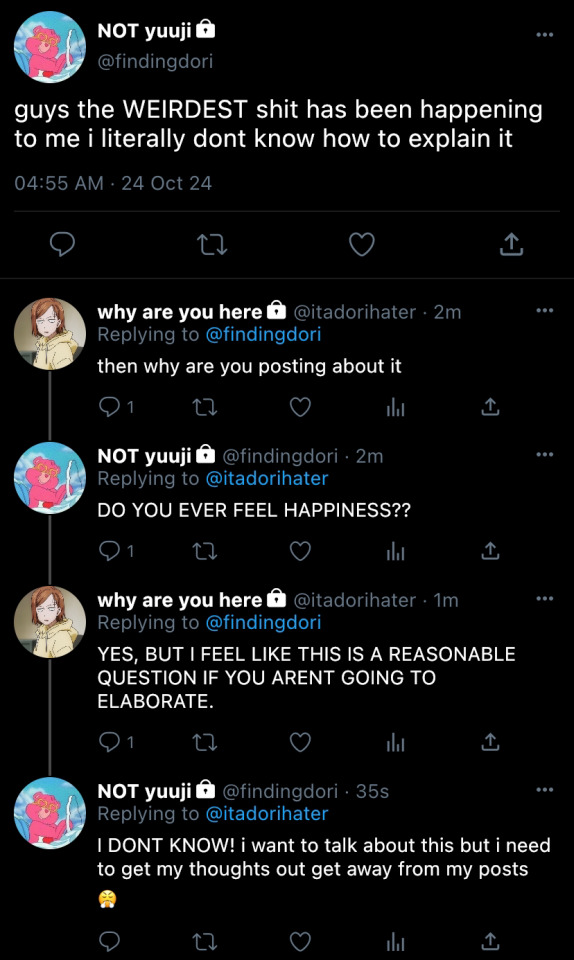


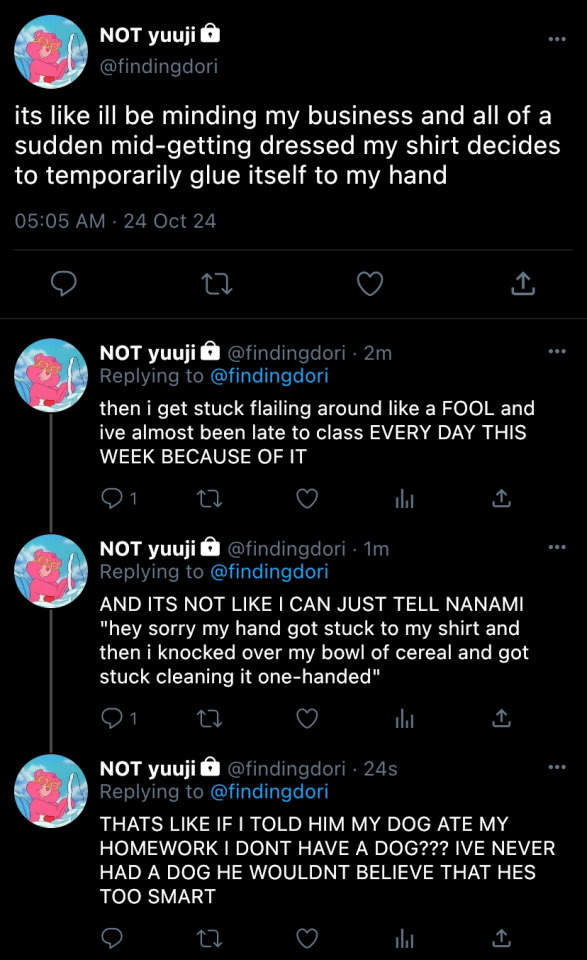


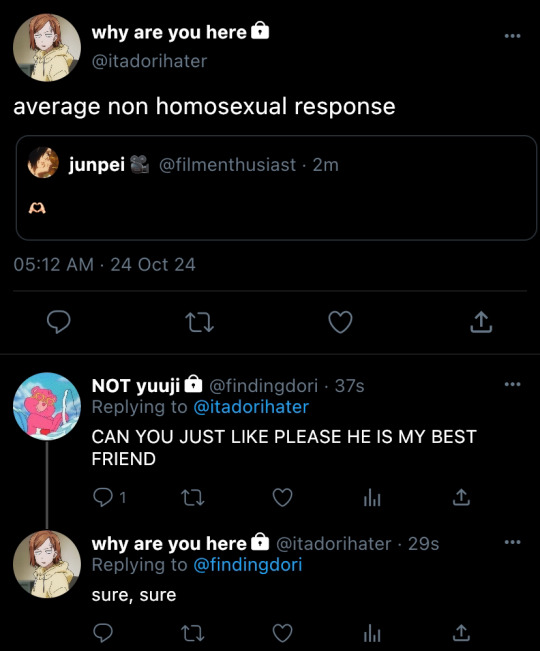



It’s been two weeks since Yuuji was bitten by that god forsaken spider, and while the bite itself had simmered down and was no longer irritated, everything else about his body was becoming stranger and stranger.
He’d noticed a bunch of little things that seemed to add up pretty quickly with how significant they affected his daily life. The sticky hands, being number ONE on that list. Seemingly the hardest thing to write off as a coincidence and something that was just… odd, it also wasn’t just something he could ignore when it happened, because then his hand was uncontrollably stuck to something, and he couldn’t UN stick it. The number of times that he’d been late to class over it this past week was becoming a nuisance because now, Nanami was stepping in to ask Yuuji if everything was going alright outside of class.
How was he supposed to tell him, yeah, everything’s just dandy! My hand just glues itself temporarily to random things at random points in the day, but I’m figuring it out!
He’d be sent to the nearest psychiatric ward. Or maybe, Shoko would pick apart his brain, which might just be worse.
Among the other things he’d begun to notice were things like an increase in his strength, which suddenly seemed to become inhuman. Yuta dropped his pencil when they were hanging out the other day in he and Toge’s dorm room, and Yuuji nearly threw his desk across the room when he lifted the corner so Yuta could retrieve it.
“Holy shit, Yuuji, that definitely wasn’t necessary,” Yuta laughed awkwardly in shock at the desk which now sat on its side. All Yuuji could do was stand and stare at it, dumbfounded.
“I literally only meant to lift the corner, I’m being so serious right now,” his flat voice really showing that he didn’t even know what to make of the situation.
Yuuji also noticed his reaction times (mostly becoming apparent at his football practices) were increasing too. Something he wouldn’t normally even see coming because it was when his eyes were closed, or when his back was turned, he’d have taken care of before he even realized what he was doing. Like his body was reacting before he was.
The last thing was his oddly fast healing time. Bruises would only last a day or two, depending on the severity of the injury, and past that there’d be no evidence that there ever was an injury in the first place. This one especially was a bad thing for Yuuji of all people to deal with because that just meant he could be as reckless as he wanted and not face many consequences, if any at all. He was already a klutz and an airhead most of the time, so now he was just a ticking time bomb for stupid decisions.
Since all of this started around the same time that Yuuji received the spider bite, he’s a tiny bit suspicious that the two are related, but he can’t reasonably put the two things together in a way that feasibly makes sense in his mind. Why would a spider bite give him weird superhuman powers???

author's note:
tehehe writing this is soooo much fun for me i rlly hope everyone feels enough in character :o and as a reminder if youd like to be added to the taglist pls dont be afraid to ask! :3c i do nawt bite 🫶🏻
jump to:
Prologue | Previous | Next
taglist:
@meme-ty7 @runfrme
#itafushi#itfs#jjk#jujutsu kaisen#socmed au#megumi fushiguro#social media au#yuji itadori#yuji#itadori#jjk itadori#megumi#fushiguro#nobamaki#inuokko#yuta okkotsu#toge inumaki#nobara kugisaki#maki zenin#aoi todo#junpei yoshino#yuji itadori x megumi fushiguro
20 notes
·
View notes
Text
Wandee Goodday Episode 8
In which we have many confessions (both wanted and unwanted), further (mis)communications and the sweetest proposal scene in BL land.





First thing, YeiCher owned this episode. These 2 just complement each other superbly. I’m sure we will see some conflict down the road with Yei hiding the debt of their boxing gym from Cher, but for now, I’m basking in joy with the fact we have YeiCher being formally engaged in a timely fashion to commerate with the Thai senate officially passing the bill to allow marriage equality in real life!
As for our YakDee…I’m a bit confused. Look, I am thrilled they made up quickly - Yak giving back that ugly necklace (it’s not to my aesthetic taste but I am definitely glad it made it back to Dee’s neck!), Dee informing Yak he no longer has any feelings for Dr Terrible plus Yak sweetly informing Dee “this hottest and most dashing boxer is yours.”


So…WHY ARE THEY STILL IN A FAKE BF relationship?? I initially thought I might have misunderstood the whole thing. However, when Dee asked Yak to accompany him to the hospital anniversary ball - Yak said “again?” And Dee saying otherwise he would accept Dr Terrible invitation to the ball.


And what made it clear these 2 adorkable idiots have yet to re-define their relationship properly is the conversation between Dee and his wise grandmother - she sensibly asked whether YakDee is still just FWB? And Dee said there is a dateline to their relationship? Maybe someone who is cleverer than me can explain this? - is it cause Dee is angling for the scholarship and thought he would have to leave Yak anyway??








Cause why will you cook for him, dry his hair, massage his aching legs in front of the whole gym, learn how to slow dance, take him to a fancy costume place and pick up a matching grooms outfit if you are both not in love with each other???



Despite my confusion about their relationship status, I did love the whole ballroom scene - from Yak dashing in last minute in time to ask for his prince for the dance, YakDee slow dancing and Yak finally confessing in words that he is in love with Dee. Does that mean they will finally be real boyfriends next episode? (Although from the preview, they are STILL NOT together as real boyfriends?)


Dr Terrible remains shameless and desperate. If I’m not mistaken, Dee rejected him 3 times in this episode alone - when he indirectly decline Terrible’s invitation to the ball by expressing he will be bringing his significant other, saying no when Terrible said he will dance with Dee because of Yak non-presence at the ball. And when that did not deter Terrible (he tried to kiss Dee! 😤), Dee bluntly say he has outgrown Terrible and only regards him as an older brother. However, Terrible has yet to learn his lesson - he left his date (Dr Khwan you deserves better) to again try his luck with Dee. So, I’m glad it seems Dr Khawn left him after Yak timely arrival to save his prince from the evil clutch of Terrible.


As for Taemrak, I do feel bad for her. It’s clear now she does have some feelings for Yak. I think pre-Dee, Taemrak might have taken for granted of Yak’s friendship and affection for her. He was always there for her with his easy banter. But with Dee around, Yak no longer txt/msg/meet up with her beyond school. Nevertheless, I’m glad she still trust Yak to come for her aid (although I must say, what a plot twist - didn’t think Ohm will be so nasty. And Yak, couldn’t you have told Dee why you had to leave him suddenly before the ball??) Like I say, (mis)communication seems to be the theme of this episode.
Overall, I like the episode. I was hoping for more of Dr Kao though, but YeiCher sweet scenes made up for Dr Kao’s absence. And 2 big thumbs up 👍 from me for their ongoing PSA re: HPV vaccine! ❤️
Bring on episode 9!
#wandee goodday#episode 9#yakdee#YeiCher#sweetest proposal ever#I will die for Cher#also for grandma#great sapol#inn sarin#thor thinnaphan#fluke nattanon#ployphach phatchatorn#aj chayapol#veeraporn nitiprapha#emi thasorn#podd suphakorn
34 notes
·
View notes
Note
Hello! I need your thoughts on Wandee Goodday! In ep 1 I remember Dee mentioning that Ter helped him decorate his whole apartment & pick out his furniture. Thoughts on what that means with all the suggestive neon lights? Did ter pick those??
Hi, Anon.
Interesting question.
If I remember correctly, Dee said that Ter helped him pick out every piece of furniture. So, you're right about that. I can't remember the decorating thing, though.
Anyway...
Let me be a bit nit-picky before I get into the interesting stuff... Lamps aren't really included in the furniture category (lamps are more details/decor/embellishment). Furniture are things like sofas, tables, beds, etc. The bigger, moveable things that make a space more liveable.
However, this might've been a subbing thing, and what Dee said in Thai might've meant all of it.
In other words, I have no idea if Ter picked out those neon lights.
Maybe he did. Maybe he didn't. We might never find out. I can only speculate at this point.
So, speculation time it is!
If Ter suggested that Dee should buy the neon lights Dee's condo is so beautifully decorated with (imo), he might've chosen this sign...

To influence Dee to be less "vanilla" and more to his own taste (because no matter what Ter says, he definitely feels something for Dee, I just don't know what that is, yet). And if Ter did pick out this sign for that reason, he definitely wanted it to be placed above Dee's bed, and that just makes me loathe the douche even more (lol).
Could it be that he secretly likes Dee and, therefore, chose this pink sign (since pink symbolizes love)? Sure.

In other words, if Ter picked out those two specific neon signs, it might be a sign of his affection towards Dee (but possibly also manipulation if he tried/is trying to get Dee to change).
(Let me nerd out about color and their symbolism for a moment... The sign above Dee's bed is purple, which we all know is a mix of blue and red. Blue is sometimes associated with manipulation while red is sometimes associated with strength/dominance, which sounds like Ter and his audacity to ask Dee to let him have the scholarship. So, if Ter picked out that sign for that reason... The douche! However, blue is also associated with trust while red is associated with passion, which sounds more like Dee and Yak's developing relationship, right? So, if Ter picked out those lights to be a manipulating douche, I'm glad it's backfiring on his ass.)
Also, if Ter did pick out every piece of home decor in Dee's condo (furniture and everything else), I feel like things will start to disappear/be replaced the less Dee is hooked on Ter and the more he starts to feel things for Yak. Sort of like cleaning out your ex-lover's shit if the relationship ended on bad terms (which Dee's crush on Ter definitely did). So we might start to see what home decor were Ter's choices before we're told what his choices were (if we're ever specifically told beyond Dee's comment in the 1st ep).
Right now (we're still only 3 eps into the series, so it's still early on) the neon lights haven't disappeared. They've slightly changed color, at least in the bedroom, but that has more to do with Yak than Ter.


Just like the addition of that small yellow light (representing Yak) in front of the TV, which wasn't there before.


And the fact that Yak helped Dee fix that yellowish light that was blinking before.

And that more yellow light appeared at the end of the 3rd ep after Yak agreed to the fake boyfriend relationship.
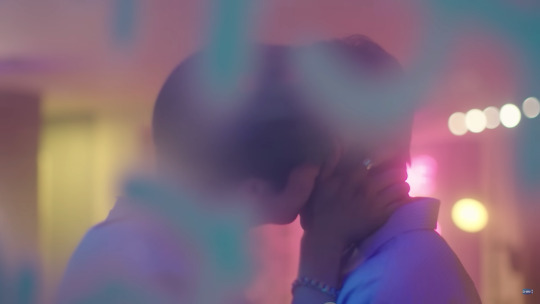

I don't know if this really answered your question, or if my ramble made any sense. But it was fun to ramble about color for a bit.
Thank you for your ask.
#ask me anything#ice queen answers#iq color post#color theory#color symbolism#big color moments#neon colors#pink#purple#yellow#wandee goodday#wandee goodday the series#thai ql#thai bl#thai series#my shit
28 notes
·
View notes
Text
🚨SPOILERS FOR FANTASY HIGH JUNIOR YEAR EPISODE 6🚨
Dimension20 "Fantasy High Junior Year"
Episode 6 "Party Politics"
Timestamp: 1:41:19
Video Length: 4min. & 56sec.
Riz's Pass-Fail theory gets debunked + Ragh reminding everyone about dinner with his mom + Fig saying she might not wanna be a bard anymore
Riz: "I also think we have to be really careful going forward, because Kipperlilly's team is trying to get us kicked out of school or get us to flunk. I think we need to find out what happened to Lucy Frostblade, if Lucy actually died. But I do know that you switch to pass-fail if somebody from your team dies."
Kristen: "Right, did they need to switch to pass-fail?"
Riz: "But if Kipperlilly were to-"
Adaine: "But it's only for the year, right?"
Riz: "-become class president, maybe she could change that rule. Maybe they just need good grades to get into whatever school that they're trying to get into."
Kristen: "Why does she want to be president? Yeah."
Riz: "That would be, that's why they need-"
Emily: "But, Ivy didn't act like...I mean, yes, it's possible that she saw, but she would have to be able to... It's not like I rolled a bad Deception."
Riz: "Either way, even if Lucy left the party, if your party is incomplete, you switch to pass-fail. So if any of them can't afford to go to school or something, they can't get scholarships now."
Brennan asks Riz for a history or investigation check and he gets a 28! 😁
Brennan: "As you're speaking, you remember that slip in the yearbook and you know that yearbooks come in time for graduation. But you suddenly remember that there's usually about a week or two weeks in between when your final exams are."
Murph: "Right."
Brennan: "And there's no more things that affect your grade after that. Having done all that research beforehand, the majority of the pie chart of when Lucy could've 'disappeared' that they wouldn't have been able to include it in the yearbook is actually in a period of time where there wouldn't have been grading. It would've been after finals."
Murph: "So if you start a new year, you can have a different adventuring party?"
Brennan: "Yes, basically you can't swap in ringers in the middle of your school year."
Lou: "But it makes sense that they would want to bring in a ringer like our not bad baby, Buddy, who is the backup team chosen one of Helio. They see a chance to bring him in, you kill Lucy."
Emily: "'Cause Lucy Frostblade, I'm almost like, was she not healing-focused enough?"
Brennan: "It's not listed in the yearbook, but finding out what domain she was associated with-"
Emily: "Me, I'm thinking war domain when I hear Frostblade."
Siobhan: "Right, and if he's Helio, he's a light domain cleric. Right?"
Lou: "We shouldn't be prejudiced like that."
Brennan: "Yolanda would've taught Lucy, so your cleric teacher-"
Ally: "Okay, great."
Brennan: "Your cleric teacher would've taught Lucy."
The bad kids have their egg slurry! 😭😭💀💀
Brennan: "And then Ragh wanders out, and you can see that he's scraping butter and sweat off his body that's been there all night."
Ragh: "Um."
Gorgug: "Were you supposed to take a shower a while ago?"
Ragh: "I did." 😭😭😭
Gorgug: "Really?" 😭💀
Adaine: "Wow, did you use soap?"
Ragh: *rolls eyes* "****!" *turns around*
Fabian: "Which shower did you use?" 😭😭😭
Brennan: "He[Ragh] turns around. 20 minutes later, he comes back out" 😭
Ragh: "Mom's making lunch."
Everyone remembers 😂🤣💀
Riz: "Okay, yeah, we're gonna go have lunch with your mom. Let's go do it."
Kristen: "Before we go, does anyone else have any big 💩 weighing on their hearts and minds?"
Fig: "Um, I think I don't wanna be a bard anymore."
Kristen: "Really?"
Fig: "I went to warlock class, and it just clicked."
Kristen: "Dang, okay."
Fig: "It clicked."
Fabian & Riz: "That's cool."
Adaine: "For warlock class, did you have to buy like 10 barrels of diamonds?"
Fig: "No, we just talked about the power of relationships, and I just feel like that's my 💩."
Adaine: "That's so interesting to me."
Zac: "But we now are locked in our classes, right?"
Brennan: "It's already been the first week of classes, yeah."
Zac: "This sucks."
Brennan: "But! There are offices. The vice principal's office is there. If you guys wanted to switch classes mid-year or do other stuff, you can submit that. It was due on the 1st of the year, but you've seen there's a lot of loopholes and interesting things. Arthur Aguefort, over hundreds of years of running this school, has said a lot of contradictory stuff, and one of his rules is that anything he verbally said became school canon."
Emily: "So we can pick and choose quotes of his."
Brennan: "Yeah, exactly, so there's a lot of wiggle room if you wanna switch a class, right?"
Riz: "Maybe if Kristen becomes school president, maybe we make some of this stuff a little simpler. I feel like we've been doing a lot of stuff, some practical application of our classes, and I feel like we haven't gotten credit for like half the stuff we're doing. We're having to destroy ourselves to pass these classes."
Gorgug: "This is a good platform."
Kristen: "Okay, yeah, right."
Riz: "And this works for everybody."
Kristen: "Can you write a little speech about this?"
Riz: "Of course."
Adaine: "World saving should count more than rat *******."
Kristen: "That is perfectly put."
Brennan: "You head to Mordred Manor. As you do so-"
The dome turns REALLY BRIGHT! 😂😂💀💀 Big color change! 😂🤣💀
Ally: "OMG!"
Brennan: "It's so bright!"
The amazing caption team: "(Zac croaking)"
Ally: "I'm wearing two pairs of sunglasses."
Murph: "Yeah, Riz is also wearing sunglasses."
Adaine tries to cast "Dispel Magic" at the sun! 😭😭✋✋
Brennan and Ally's laughter! 😂😂 Dispel Magic at the sun was funny fr! 😂🤣💀
#dimension 20#dimension20#blog#fantasy high#fantasy high junior year#party politics#fantasy high party politics#fantasy high junior year episode 6#fhjy ep 6#fantasy high scene#fantasy high junior year scene#dimension20 scene#queue#the bad kids#bad kids#the intrepid heroes#intrepid heroes#ragh#ragh barkrock#brennan lee mulligan#lucy frostblade#the ratgrinders#the rat grinders#ratgrinders#rat grinders
26 notes
·
View notes
Text
The Story Behind Shizuke and Fashion
I am a sucker for clothes telling a story so my OCs end up changing clothes a lot across my MLB au. Most only have subtle changes like Blair's palette favoring more orange as time goes by or Natalia changes her hair style a lot after getting dumped until she settles on a ponytail... But it's Shizuke who actually has the most drastic shifts as a whole.
Punk Goth Era
Here's something I've been flipflopping over but... What if Shizuke had a punk goth era? Shizuke, the glasses guy who's always dressed like a prep and is the poster child for the Asian nerd stereotype (except not really he ain't book smart enough for that)? He used to wear matching outfits with his delinquent friend Fiona. Their friendship isn't actually that odd.
This isn't just for the fun gap moe contrast or because I really liked dressing reverse!Shizuke as this edgy looking guy in a leather jacket post-quitting the Supreme. I think it can strengthen Shizuke's character and how much he keeps changing to adapt and to be what he feels he needs to be. I happen to like it when clothes can convey something about a character.
It also highlights his dynamic with Fiona. She is his first real friend since he moved to Helios. The one who chases out the bullies, his protector, the toughest person Shizuke knew. The one who didn't turn their back on him when he needed help.
Over the years though, what used to be reassuring became kind of a point of insecurity for Shizuke. He's the wuss hiding under her wing. He doesn't want to depend on her forever. He wants to get stronger. That's why he took up Judo. That's also why he tried to dress like a punk - dress like Fiona.
Fiona was the one who supported him in his efforts, went with him through every martial arts club til he found his niche, and even helped him pick out clothes to look more intimidating. He even knows how to do makeup and paint nails. It has her written all over it.
Preppy Nerd
His main outfit and the one most people are familiar with, in and out universe. The thing that made him switch to nerd clothes is because one day, his parents could no longer afford to keep him in his school. It was one of those highly reputable ones full of scholarship kids and rich kids who bought their way in. As I've said, Shizuke isn't very book smart, so the only way in was for his parents to pay tuition. They only went for it thinking they weren't gonna stay for more than three years in Helios City, might as well get their kid into a good prestigious school that'll look great on his records even with his B-C average. Anyway stuff happened, his parents decided they're gonna have to go back home to Japan and Shizuke can continue his studies there.
Keagan wasn't having it so he pulled strings to get him into his mayor father's scholarship program - who was only willing to do so because despite his academic records not passing his requirements, Shizuke's his son's more responsible friend who at least messages him to reassure him they're safe and where they are whenever his son decides to sneak out, so Mr. Aurelio would rather Shizuke sticks around.
Shizuke is once again on the receiving end of help from his friends. Feeling like he might taint Keagan and his family's reputation for this special treatment, he changes one again. He has to at least look like he earned his way in so he replaced his punk goth clothes with something more "appropriate". The red tie and maroon pants he wears aren't just a reference to Ladybug, they were first a reference to Keagan and his family's signature color, red - which funny enough, loops back to Ladybug cause they're like, showing nationalist pride in their red hued island city made from a ginormous Lucky Charm.
This is made worse by the time Scorched Origins rolls in. He is Ladybug now. And Keagan was the first akuma who was and still is deeply affected by the event. All that red, it's no longer just about the Aurelio's scholarship, it's about his duty to Keagan and the rest of the city. He has to be at his best as he fills the large shoes Ladybug wore. He has to seem more put together, more mature, not a thread out of place and not a wrinkle to be seen. His outfit gets more uptight the worse he feels this.
Dressing for Others
The nerd outfit ties into Keagan the way his old punk clothes ties to Fiona.
There were whispers of envy that came with this though.
“Take off your rose-tinted glasses and see past that ‘nice guy’ façade, Blair! I’m telling you, that guy’s nothing but a social climber who uses everyone around him then dumps them once they’ve stopped being useful!”
“Just look at the people he surrounds himself with! He’s clearly using them for his own gain!”
“Keagan got him a recommendation into the scholarship program. Perks of being the friend of the mayor’s son, didn’t have to fight tooth and nail for a spot here like the rest of us,” Natalia growled, jealousy rolling off her in waves.
“Fiona, the little monster, has gotten into a lot of fights with a lot of other delinquents over the years and has never lost. With her by his side, no one would dare bully him.”
Here's some quotes from Natalia from the Bully Hunter episode as she summarizes Shizuke's rep from the side of the school that doesn't like him or are distant from him. She even nails the thing that bothers Shizuke the most about their friendship:
“But what do they get out of him? Nothing! He’s not even there for them when they need him the most!”
Shizuke's motivation across the main story goes all the way back to his friends helping him out and wanting to pay them back. It's why when asked at point blank on his debut on what motivates him, he searched around the crowd and looked at his friends whole saying he wants everyone to be safe. He wants them to be safe.
It's for them he goes through with being Ladybug even though he feels he is unworthy of it. It's only as Ladybug he's strong enough to be the one protecting them just as they had always protected him.
And just like his nerdy getup and his former punk phase, he wears the Ladybug suit for someone else.
When Will He Dress for Himself?
It'll be the day he can fully accept himself for himself.
The final style for him should still have little elements of both styles but is over all a lot less strict with sticking to a specific style. He's finally wearing the Ladybug earrings on his ears. The main piece is a varsity jacket, a symbol of his greatest achievement in his civilian life where he finally earns his own scholarship through the Judo club by getting into their competitive team.
The first step though is to truly understand he is good enough.
#Shizuke Midorikawa#btal#n2cats#he and adrien can bond over this lol#btal notes#hes trying to find his own style 😂 what a teenager#meanwhile Blair's just like i look good in everything so it doesnt matter lol
4 notes
·
View notes
Text
Who Has a Crush on You?
Pile 1. Pile 2



Pile 3
☆
☆
☆
Pile 1
Cards pulled out:
Five of swords, three of pentacles, four of sword in reverse, eight of pentacles, page of swords.
So my pile one So what I can see is that maybe you and this person might've walked away from each other, or he walked away from you. This person may have a lot of self sabotaging behaviors. I see that there's a lack of communications between you both.
He/she/they might've tried to ignore their feelings for you cause maybe they didn't want to get rejected and they're trying to focus on their work/career/school.
I see you guys might know each other as acquaintances or you guys mightve worked in team groups or did a collaboration in work. Something about a work place. That's where you guys mightve met.
This person could be really trying to work hard on growing and learning and maybe finding mental stability and finally rejoining or coming out of his/her/their shell to socialize and speak up now. Maybe they're never really took care of themselves before.
This person might need patience and he seems like a curious person that doesn't really like getting into arguments. This person is quick-witted but also very guarded. This person may be confident in their work, something to do with their hands maybe some craftsman work. They're also very smart, maybe they have a scholarship.
Okay Pile one I pulled out someone personality traits and physical traits of this person for you guys(remember this is a general reading so not everything is going to be for you)
-Self-absorbed
-Popular
-Gentle
-Ginger
-Got some abs
-Pale
(I hope you enjoyed your reading and maybe have got some insight on the person who is crush on you Pile 1)
Pile 2
Cards pulled out:
Seven of cups, temperance,the fool reverse, strength, the emperor
So my pile two, you guys one hell of a person crushing on yall.
Okay so this person may have a lot of opportunities or options. So they might procrastinate a lot or it's just something they do, they day dream a lot and might have some hallucinations. I think they might be a bit mentally ill, but I mean who isn't.
They might have a lot of balance with themselves or inner calmness, or you guys just have a harmious relationship. I think they might think yall are their like you know, soulmates. You guys might be. Not too sure.
They also could be a bit reckless, maybe be a bit stupid and they somehow always get distracted. There's something about this person and not being in reality. Like I said a dreamer. They may be very brace and confident and be compassionate.
He may be older than you even though he might not act like it. Almost like a cool, rad, reckless teenage boy. Bad boy vibes, fun guy but reckless. He might listen to metal cause master of puppets was playing and the song playing right now is "Cooler than me". So that song might tell you a lot about this person crushing on you.
Something about his father figure, maybe he didn't have much of a father-figure which might explain the way he is now. He may be a little protective of his things. Scorpio, Pisces energy.
So personality and appearance cards I pulled out are:
-tall
-a little chubby
-Courageous
-Doe eyes
-somehow a little strict, maybe with themselves or they have someone strict on them.
(Hope that helps you pile 2 and good luck with this personnn)
Pile 3
Cards pulled out:
Reversed cards:knight of cups, three of pentacles,the Hugh priestess, five of swords
Upright card: The sun
Lots a reversals lmao. So pile 3
I don't really like this person crushing on you and I pray you're not gonna be happy hearing this. This might be an ex or a Heartbreakers. A manipulative bitch, a cheater. Maybe you liked them at one point and they didn't give you back the affection.
All I'm saying is that this person still hasn't learnt from their past mistakes and they aren't willing to learn anytime soon. Might be older than you I'm seeing 2-3 years. So old but acts like a bitch ew.
I feel like you're repressing your intuition, your gut that's telling you this person ain't the one. Maybe you got unwanted attention from this person or other way around. I feel like this person is coming out of their isolation but still accepting help. (Gorl he ain't worth it)
He likes his openness, by that I mean still multiple woman and he's happy with that. He likes his freedom. Ew
Gorl don't go for him, he's obviously not fully committed. You literally deserve better I bet he doesn't have a big PP either.
But lemme pull some other cards out on how this mf personality is like and how he looks
-"Mature"
-Blue eyes
-Sarcastic
-Jealous
-Has issues
-Courageous
-Tall
Bro he ain't worth it but anyways jaaa.
I hope everyone enjoyed their reading and it was accurate or easy to understand, I'm still in the middle of reading tarot. I've only had or been reading for two years so still learning
Byeeee☆☆☆
#pick a pile#pick an image#pick a pile reading#intuitive readings#free tarot#love tarot reading#tarot deck#cinnamoroll#txt
76 notes
·
View notes
Note
Since you said you like Eridan ships How do you feel about EriKar? (Eridan x Karkat) Do you think they'd be better if they were pale or flushed?
Oh boy, this is my own issue, but you have no idea how insanely difficult this question is to answer concisely for me!
Pale
So here's the thing: Pale Erikar isn't my jam, I'd still call it underrated, and most importantly there really isn't much for me to say that hasn't already been said more eloquently and in more detail in the Eridan Essay Here. While I disagree with a lot of its conclusions, they're still well justified, including the case it makes for pale Erikar. In fact, it makes such a good case that I often find in my own analysis reasonable additions to its case.
However, half of this blog's reason for existing, besides being inspired by it, is standing up for Kanaya in response to it. I will not tolerate her persecution and being misunderstood. But to be clear that's just a silly little kanaya quote, we're all having fun here. To my understanding, the writer of that essay doesn't want to engage with the fandom as a whole, and good heavens do I get that. That being said, I come from a different philosophy of analysis that sees all existing scholarship as something to either be supported or refuted, so that knowledge in a discipline (Eridanomics) as a whole may be advanced. Meaning, a lot of my analysis may implicitly, explicitly, or just incidentally respond to claims made in that essay or on that blog. To be clear, this kind of thing is critically dependant on respectful engagement, and I would never want to appear aggressive in responding. If you try to pass on anything of my analysis to them while being disrespectful to them, you are absolutely dead to me.
That all being said, I mainly find it hard to imagine anybody specifically as Karkat's moirail, because in my opinion he was meant to be everybody's moirail. Much like his ancestor's transcendent relationship with the Disciple, he'd have very nontraditional quadrants. With him as the leader of the trolls, part of that role would be to be everybody's better half, as well as the one that can control and pacify his group as a whole, rather than just individuals. In that way, the irony of Karkat is that although he's kind of the rom com guy, he lends himself best to platonic versions of the quadrants that aren't as exclusive and committal. So while it's not really what you're asking, I do very much like semi-pale (friendship?) Erikar. But, if I woke up tomorrow having completely forgotten about my leader as omnimoirail idea, I'd very much like normal pale Erikar. Not as much as Erikan, but still. Alright long way around but we got to it: Pale Erikar good 👍.
Flushed
I haven't really given much thought to flushed Erikar yet, which means it's time to!
...
After giving it some thought, I think there's a dynamic that can make flushed Erikar fun storytelling: A deliberately obnoxious power couple performance. You have two characters that aren't just interested in finding love, they're interested in the optics and appearance of love. They match pretty well in bombast, vulgarity, rudeness, and hostility, and are just generally loud and forceful personalities, all of which ensures that others are constantly aware of a matespritship that they deliberately craft to be as conspicuous as possible. They're naturally inclined to the theatric, from Karkat's love of romantic movies to Eridan's self-professed melodrama. Everything they do is made more extreme than it needs to be. Their loving public displays of affection to their fights, they play it all up. To a point where to others, everything about them is too fantastic, too artificial to be real, like they're just playing out cheesy tropes, because in part they are.
And that's where the dynamic has its cute twist. Where other people might see superficiality, they see a form of affection that they love doing and receiving. All their heightened drama is just their unique way to demonstrate their love for each other. Behind closed doors, when nobody is paying attention, they can seamlessly switch modes from performative intensity to something even more sweet in its subtlety. The juxtaposition between their public and private personas is to them, the strongest evidence of their genuine love for one another. The hypothetical audience is allowed to savor in the dramatic irony of how they alone can listen in on the dialogue that occurs between them under their breath, as other characters either believe the facade or think they see through it. Description or depiction of their publicized affection take on a whole new meaning when the audience is aware of the nuance behind it.
As people can probably tell by now, for me shipping is all about the story that can be told, and you can easily add another layer to that one. Make it a romance that does actually start out as fake and loveless, but in which real feelings develop over time. A slow burn that other characters perceive as a whirlwind romance. Karkat, perhaps grappling with a cynical view of leadership, seeks to make himself appear as more legitimate by having a romantic partner, one that he wouldn't actually need to manage. Eridan, lonely and desperate just to be perceived as being desired by somebody else, jumps at her opportunity to play the role. In the process of crafting and maintaining their power couple facade, bam, genuine feelings. Genuine feelings that they might not even be mutually aware that they share, leading to the fun scene of a confession of love well into a relationship.
Man, I really like that now. I initially thought I'd finish this ask by saying I like pale more than red, but in the process of writing it out, I fell in love with that dynamic and I can honestly say I value it higher than pale. How ironic, that in my construction of a fiction I fall in love with it. Anyways good going to both you and another anon of an upcoming ask for making me think this one out. Flushed Erikar just got upgraded to "works really well" tier.
#eridan#eridan ampora#she/her eridan#karkat#karkat vantas#erikar#homestuck analysis#homestuck character analysis#shipping#ask response
8 notes
·
View notes